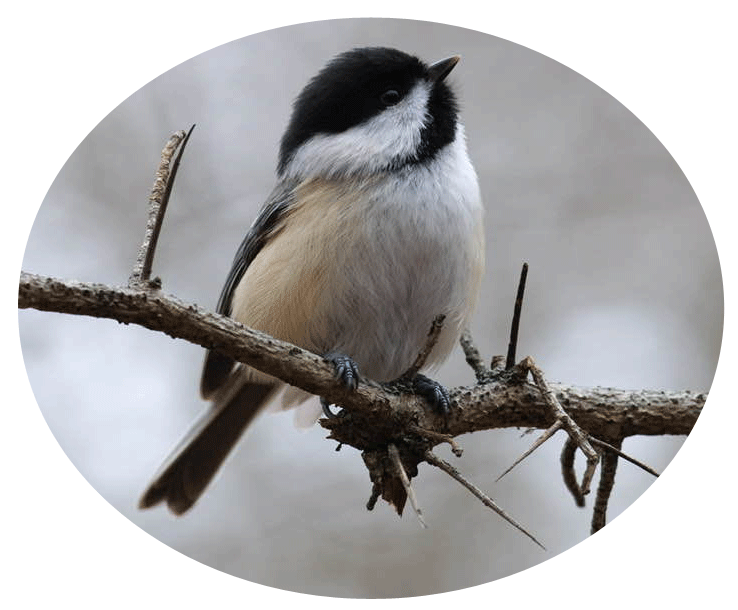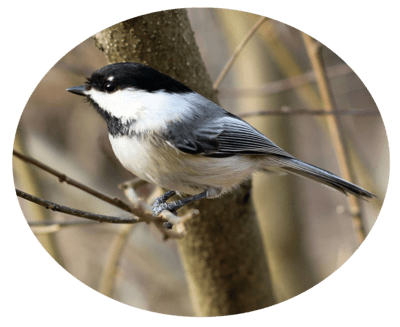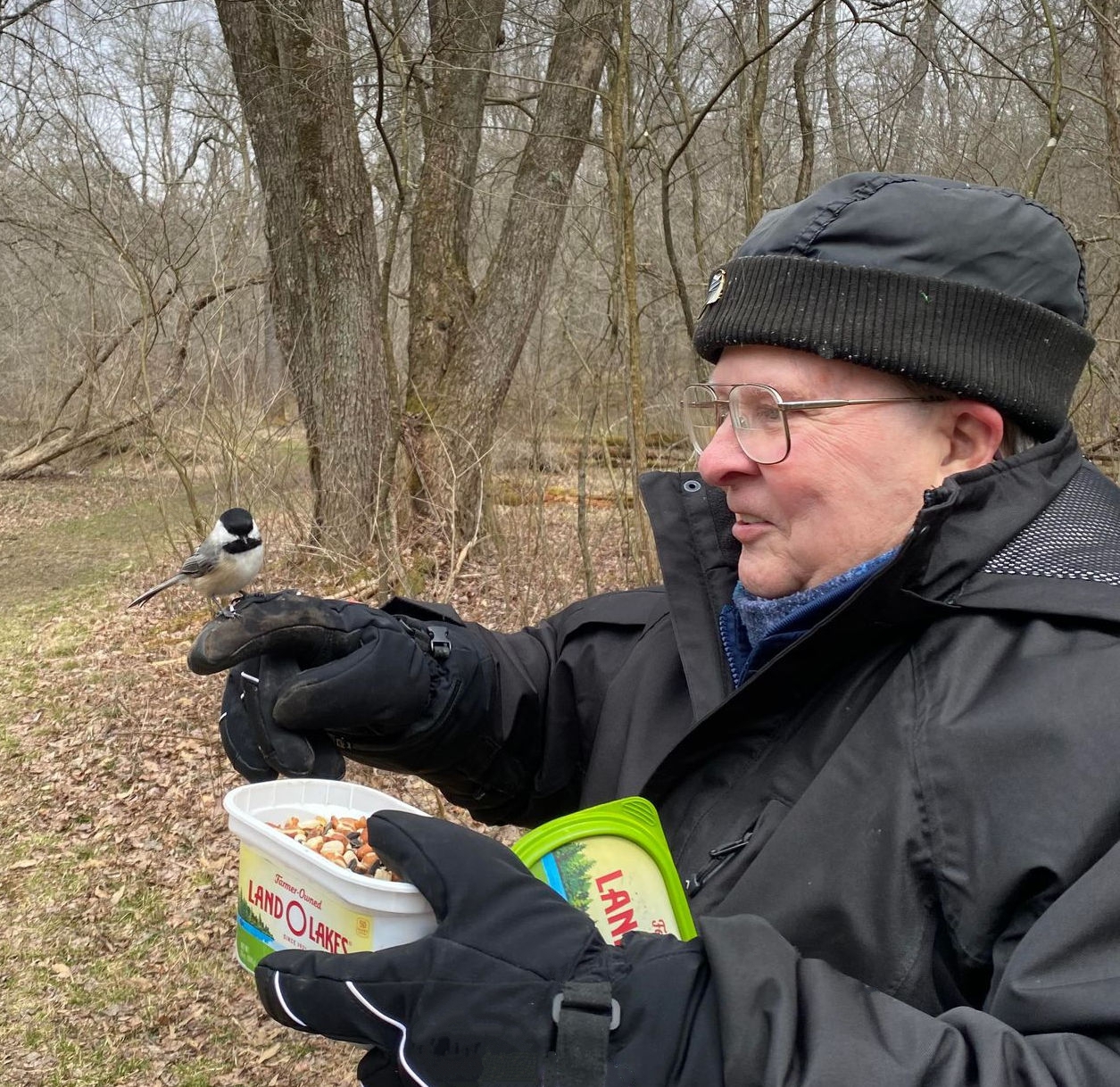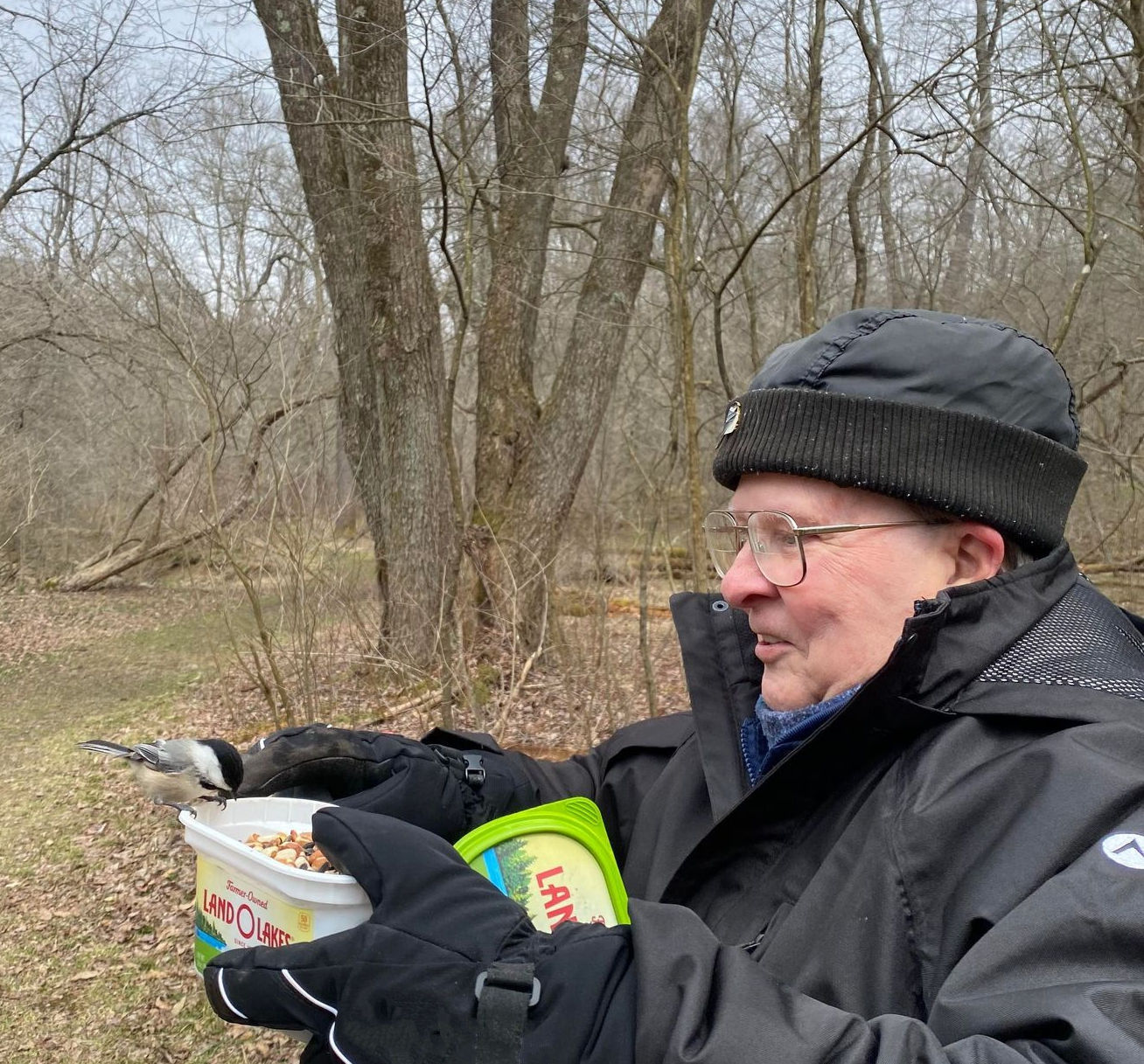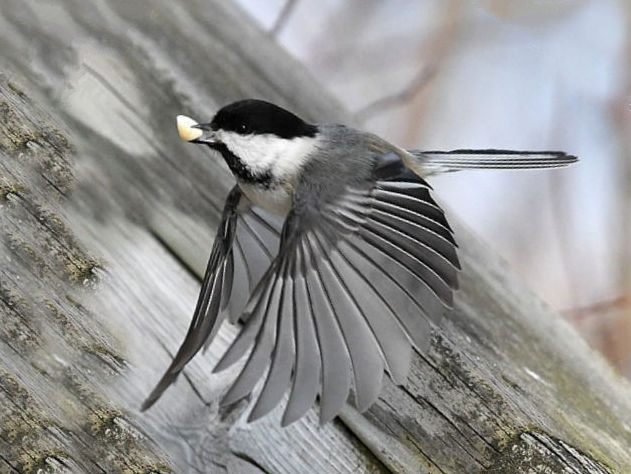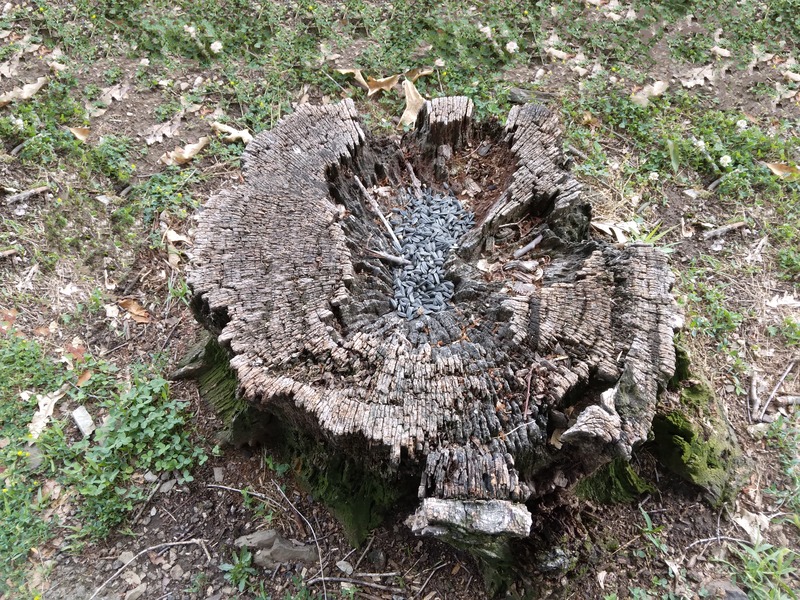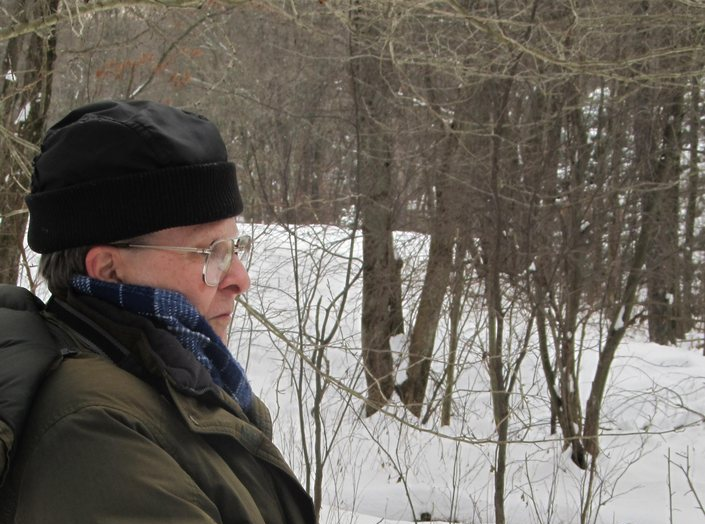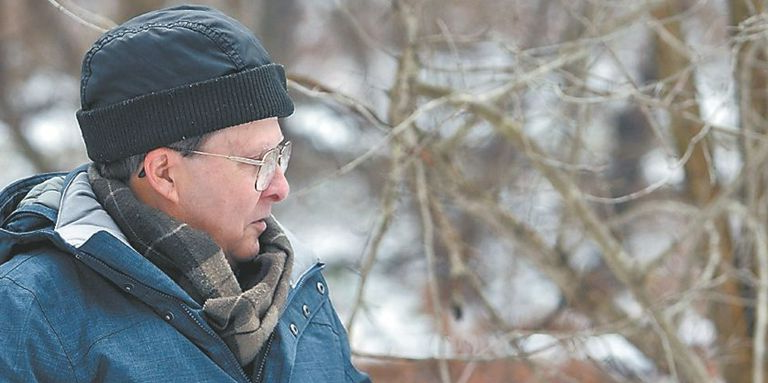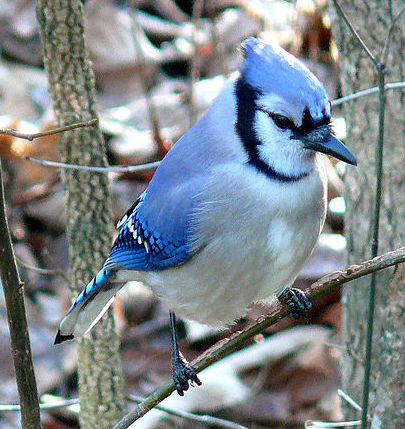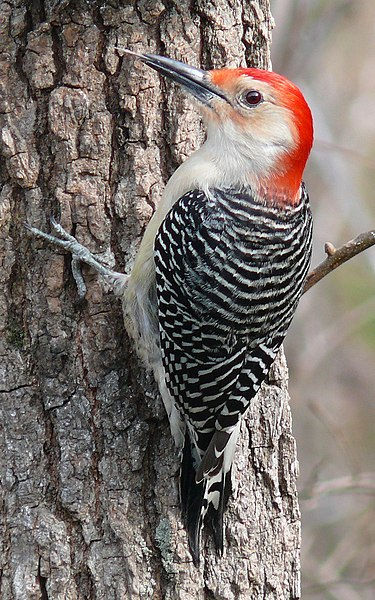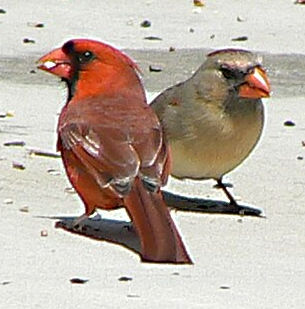"Para, I am going over to the stump to check it out."

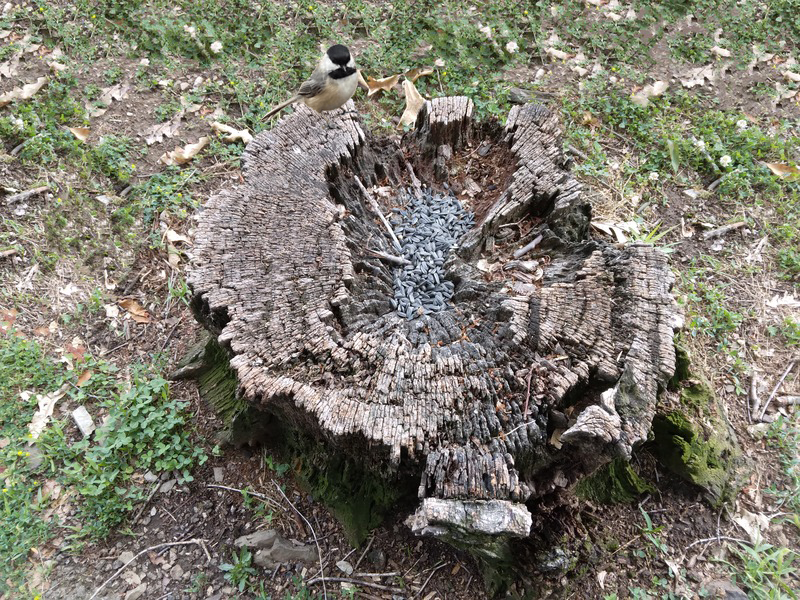
"Yep, he put seeds here again. Come on over!
He's not as far away this time, but we could still easily fly away from him if
we need to."

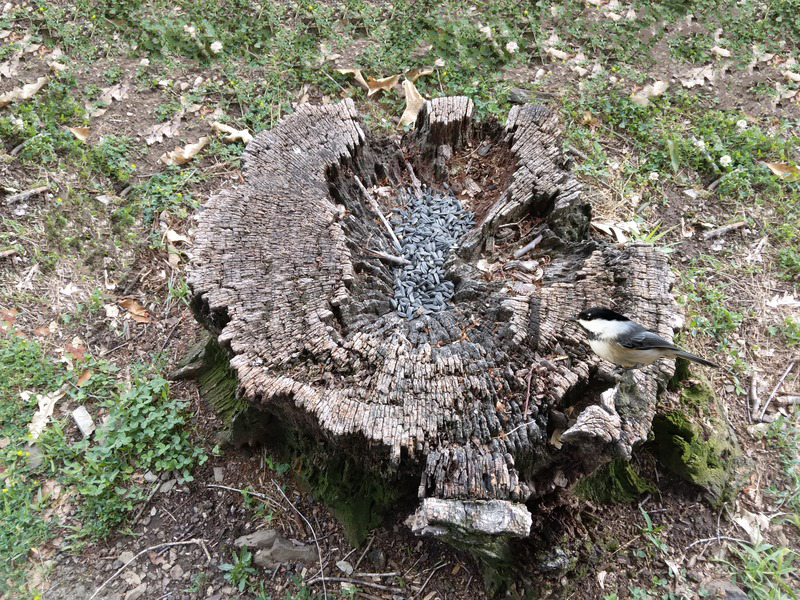
"Parus, you're right! The seeds are here
again - just like you said!
They do taste good. I am going to take a couple with me to stash now
for us to eat later. I'll put them in our cache."
"Para, thanks for doing that. That's a good
idea. I'll do the same."
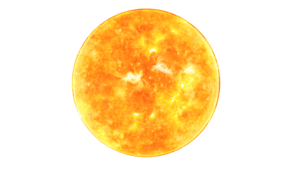


"Hey, Para, do you know why hummingbirds hum?"
"No, Parus, why do hummingbirds hum?"
"Para, because they don't know the words!"
"Oh, Parus, you're silly."

"Here comes that little guy again into
the woods and going over to the tree stump! He looks like a happy guy! He must think it is really cold out
here with all those layers of clothes. I am glad that we have these warm
feathers to keep us warm. I am glad that we grew even more feathers for the
winter season to keep warmer."
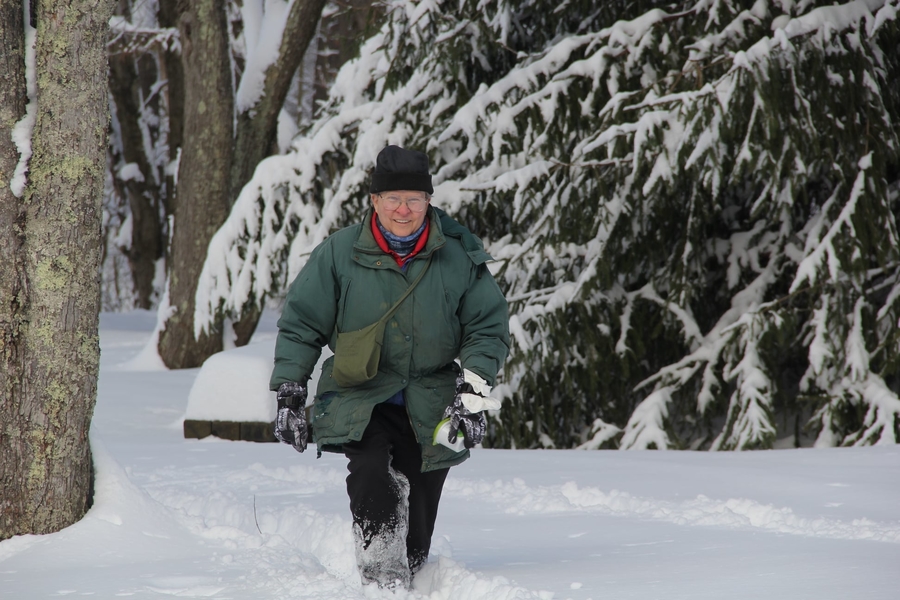
"Parus, I know you agree with me that we are
glad he is bringing these seeds to us. The seeds he is bringing are not really
necessary, but it does make it easier for us. We can certainly survive without
them. We will still eat what we find here in our woods. I still like to look for
other seeds from the plants we can find around here - and I especially like to eat the insect eggs we
find under the tree bark this time of year in the winter."



"Parus, I hear The Little Guy coming again! He
has been coming every day now for almost a month! I am glad he shakes that seed container, so that we
know when he is coming into the woods with his seeds. That sound makes me happy.
When I hear that sound, I know that I will have a good meal of seeds soon! Every
day he stands closer to the stump with the seeds, but I am not as afraid of him
as I was before. He stands still and does not disturb us when we fly close to him."
"Look, some of our friends are coming over,
too, to check out what's going on. They are also picking up seeds from the
stump."




"Here comes The Little Guy again, Para, and he
just went over to the stump. Yep, he put some seeds down on the stump, so I am
going over there."

"Para, I'm back, and I'll put this seed under
this piece of bark for you for later. Did you see that when I was over there, he
stood right next to the stump this time? He never bothers us when we get seeds,
so I picked up a seed right next to him with no problem."



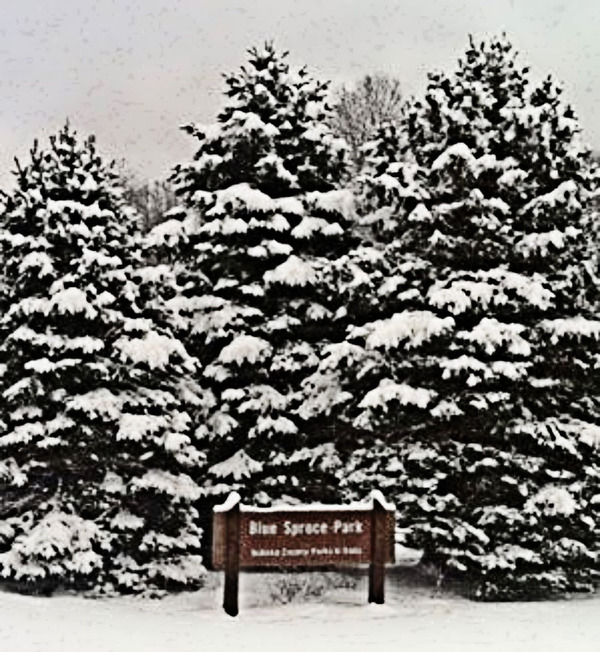
"Hey, Para, The Little Guy is here again today,
and I saw him go stand next to the tree stump again."
"Wait a minute! Something is
different today."
"He did not put any seeds on the stump, but he is still just
standing there next to the stump! I'll go check it out."
"Watch out, Parus! Still be careful!"
"Don't worry, Para, I'll swoop at him -
fly very close to him - and see what his reaction is. I'll check to see if he moves
toward me or just stays still when I swoop in closer."

"Para, he didn't move at all when I swooped
near him, and I saw that he had seeds in his hand this time!"
"I am going to go
over again, swoop near his hand, and then I am going to just touch his hand with
my foot as I fly
by to see
what his reaction is."
"Watch out, Parus! Be careful!"

"Para, did you see that!"
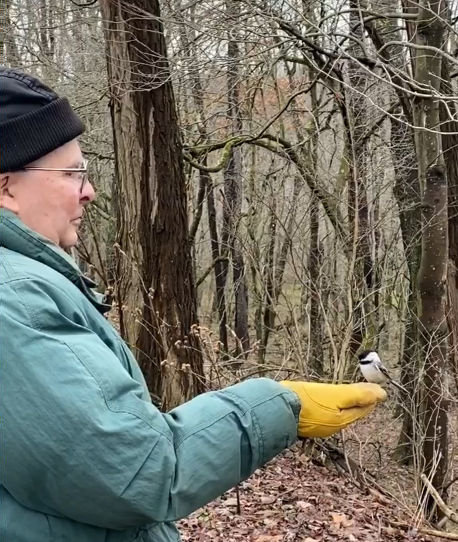
"He did not move at all when I touched his hand,
so I went back and quickly took a seed from his
hand - and here it is! I am going to go back for another one!"
"OK, Parus, I'll watch from here for now.
I'll join you in just a minute."

"Parus, whoever would have thought we would be
eating from The Little Guy's hand when we first saw him come into the woods last
month! This is working out great for us, and he seems to be enjoying being
here, too. I am not afraid of him any more. I feel totally comfortable with him being here now."
"Hey, Parus, I can see you on The Little
Guy's hand from up
here on his head! He has shown us that we don't have anything to fear from him at all!"
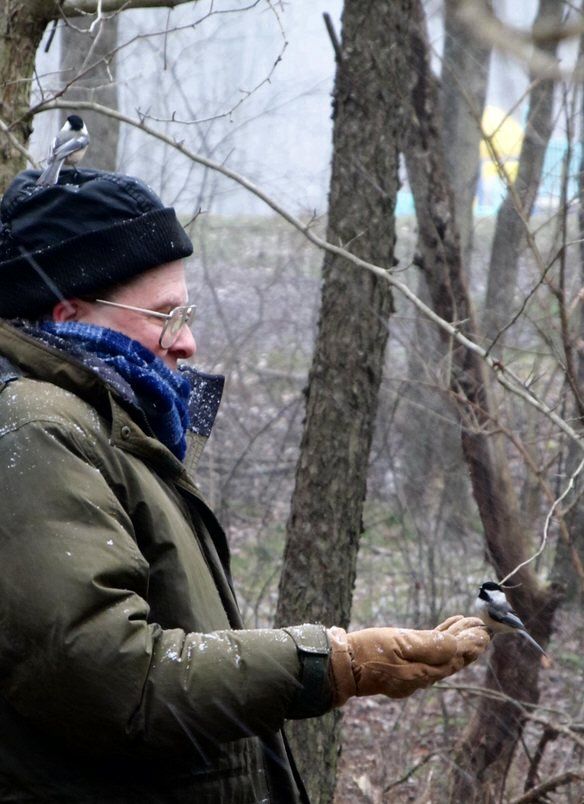
Some of our friends are also joining in. I see
that they are testing him out with their own swoops first - but then landing on
his hand to take a seed.
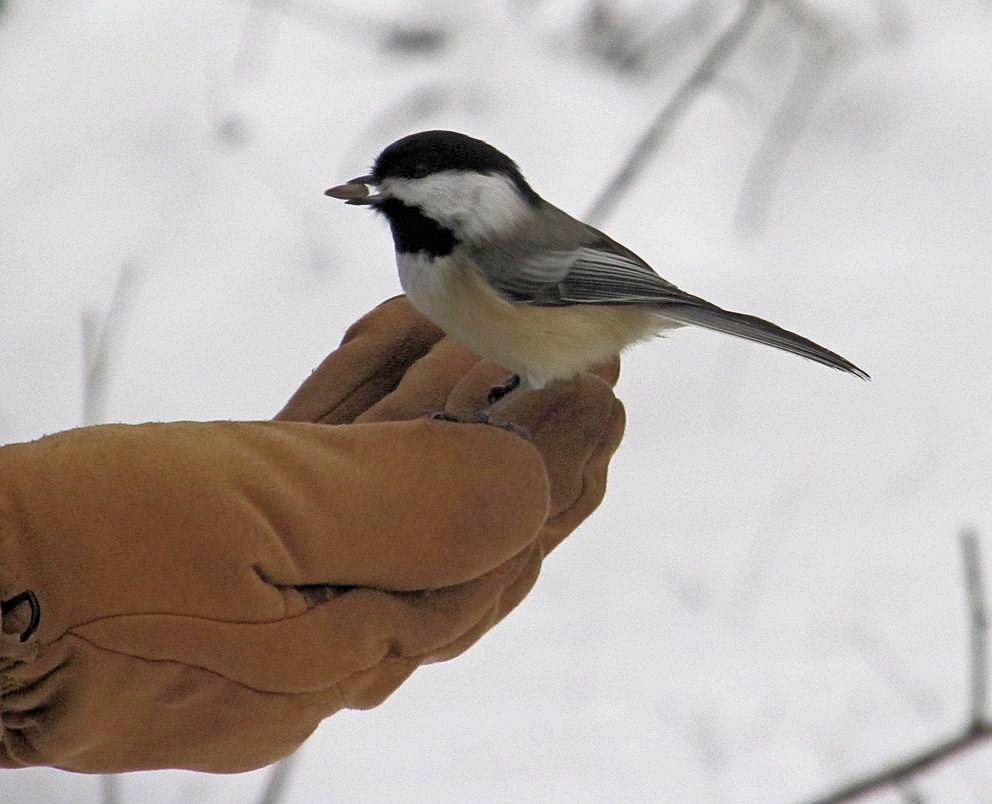



Getting
to Know Each Other
"Hey, Para, what do you call a duck in a sandy desert?"
"Parus, I don't know what you would call a
duck in a sandy desert."
"Para, you call him LOST!"
"Oh, Parus, you're silly."

"Hey, Para, The Little Guy sure does seem to be
happy to be here today with us and our friends. His shaking that seed container
sure does get our attention and gets us to come to see him."
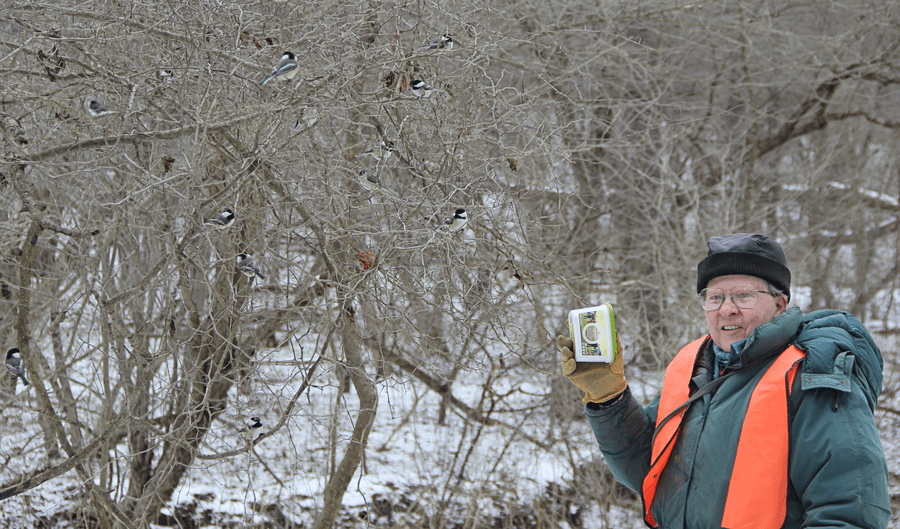
"Hey, Para, he just opened the seed container -
let's go early right now before he's ready with the seeds in his
hand!"
"Look at that expression on his face! He
certainly was not ready for us yet!" He was just expecting us to wait until he
puts his hand out with the seeds as usual. We fooled him and took seeds right
out of the container!
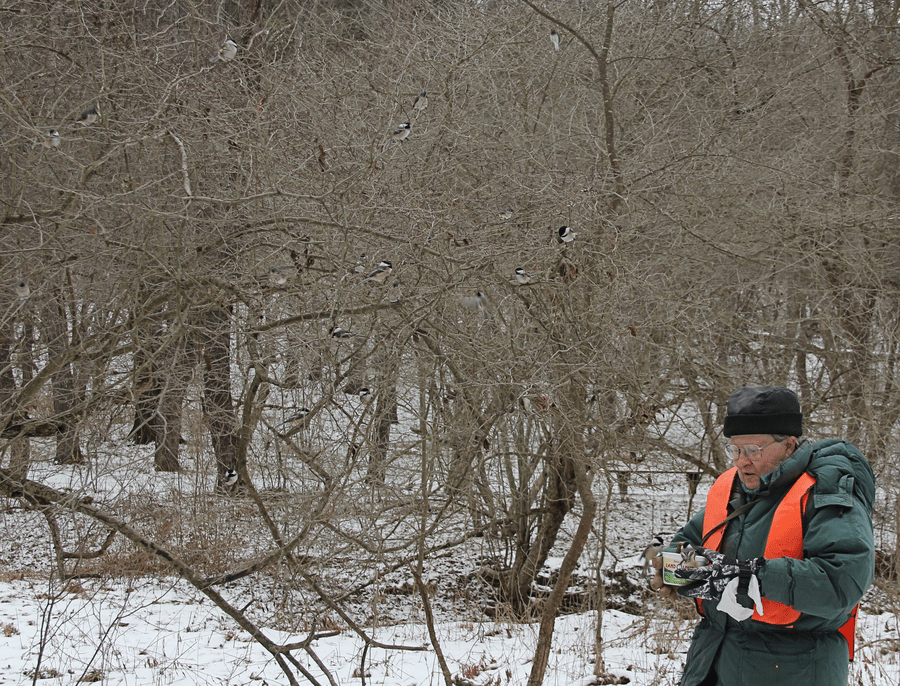
"Parus, I just heard him say to our friends in
the branches in front of him 'OK, I'm ready now. Who's next?'"
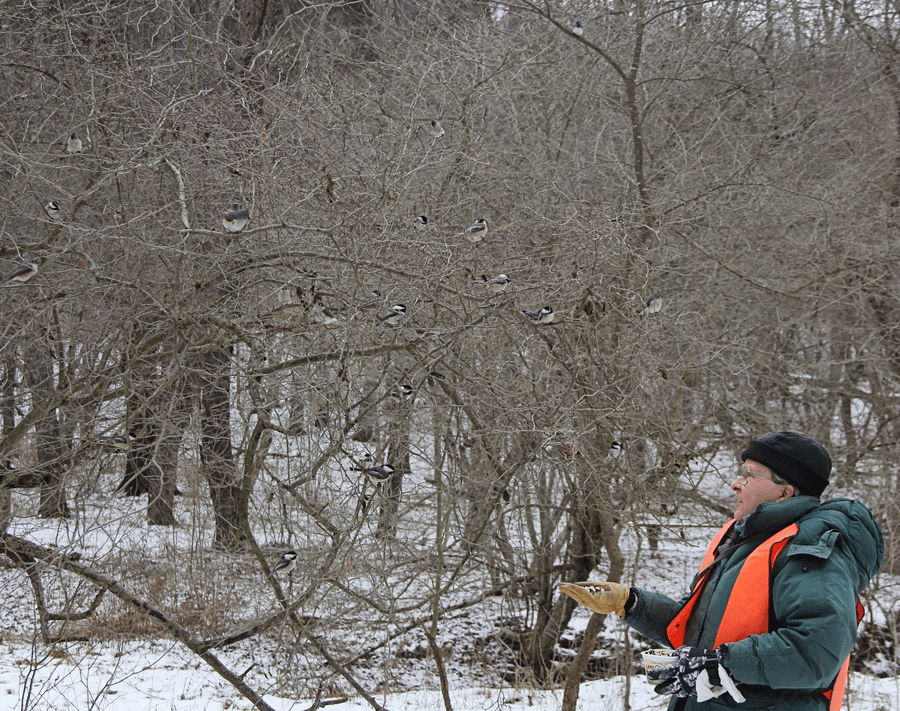
"Hey, Para, I see our friend Sharpie taking his
turn now in getting the seeds."
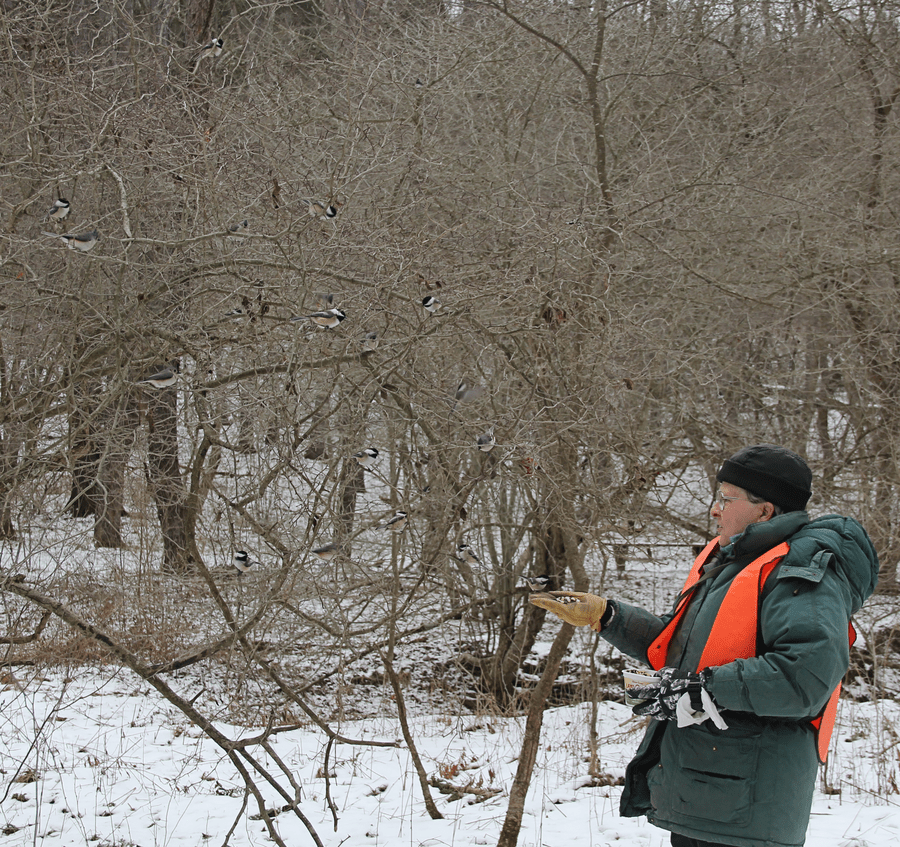
"Parus, why is The Little Guy wearing that
orange vest here today? He doesn't really need it on this trail in the park."
"There's no hunting in this part of the park."
"Para, I happen to know the answer to
that. Some of our friends from up on the hill way over there told me that they
see him hiking the trails up there sometimes with his binoculars after he leaves
here just to see other birds that are up there. There are hunters up there sometimes,
and he wants to make sure that they see him. My
friends tell me that he does not usually feed the birds up there, though. They also
tell me that he always has seeds in his pocket, and if birds who know him
come over to him, then he will put seeds in his hand for them."



Freeze!! Don't Move!!
"Parus, do you remember how just the other day
when we were with The Little Guy, one of our friends called out 'Freeze! Don't
Move!' to all of us, and then our friend kept looking up and did not move?"
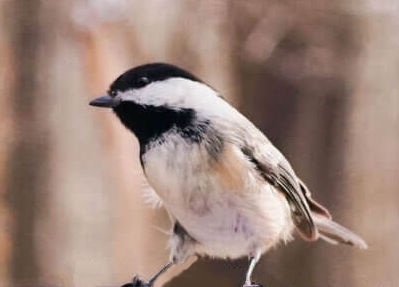
"Our friend saw a hawk flying overhead just
above the treetops, and he gave all of us the warning call for a flying threat
that is near. His warning call was a soft, high-pitched 'seet' call that tells us, as you know, that
a flying threat is near - 'Freeze! Don't Move!' He then kept looking up to
follow and keep track of the location of the hawk flying just over our heads. As
you certainly know, Parus, if
the threat had been a possible danger nearby - but not moving right then, the call
would have been a loud, 'chick-a-dee-dee-dee' call - with the more 'dee' notes
given, the stronger the alarm and greater risk.
I hear that
some Native Americans say that we chickadees are 'the bringer of news.'"
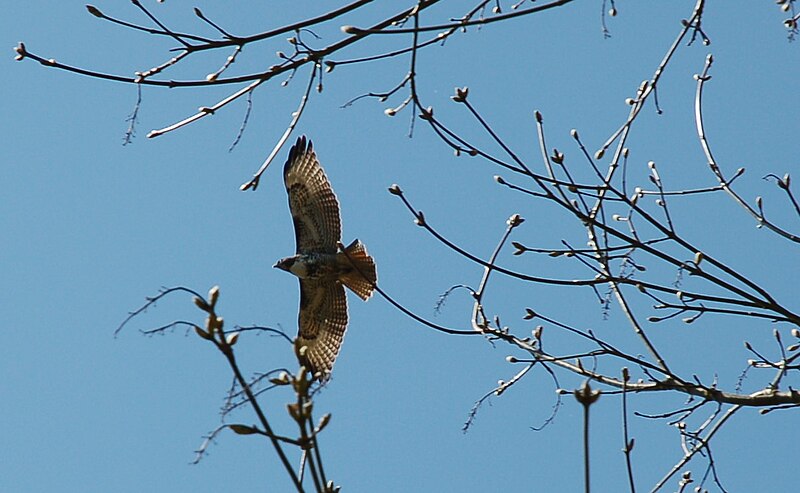
"All of us didn't move a muscle - so that the
hawk would not see us - and The Little Guy noticed that something was very
different in our behavior. Some of us didn't move even if we didn't see the
hawk, since we knew what that warning call meant - that a threat was nearby. You
know we tell humans apart by their faces, and The Little Guy's facial expression
seemed to indicate that he was confused as to what was going on at first. He knows that
our usual behavior is for all of us to be very active and always moving our
bodies and heads in some way - so all of us 'freezing' and not moving at all at
the same time really got his attention. He knows that we do keep looking all
around us for possible dangers. He kept looking at us very carefully and
wondered what was going on - until he also saw the hawk flying overhead - and
then we went back to our usual behavior after the hawk flew out of the area. I
remember that the hawk that flew over was a larger, soaring hawk, but since it
was flying lower than usual, that's why the alarm went out to all of us to
'freeze' and to be more aware of possible danger. Actually, the smaller hawks
that dart through the woods are even a greater threat and risk to us."
[To the reader: For more information on how
chickadees communicate different dangers, see
this
article.]



Meeting
Other People
"Hey, Para, do you know why birds fly south in
the winter?"
"No, Parus, why do birds fly south in the
winter?"
"Para, because it's too far to walk!"
"Oh, Parus, you're silly."

"Parus, I see that The Little Guy has started
bringing other people to feed us seeds from their hands. I have already given
them the swoop and touch test, and I think they're safe friends of The Little
Guy."
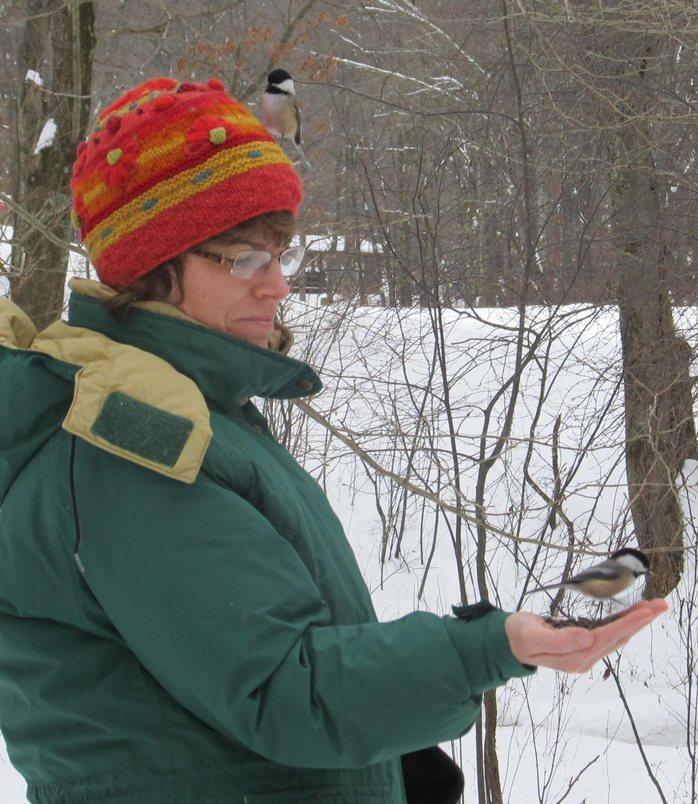
"Hey, Para, now I see you from up here - from
the head of this
new person The Little Guy calls Dawn!" Here come some other people with
seeds, too!" According to The Little Guy, these people are Jacob, Daniel, and Kasey.
I landed on Jacob's head, too, before I landed on his hand."
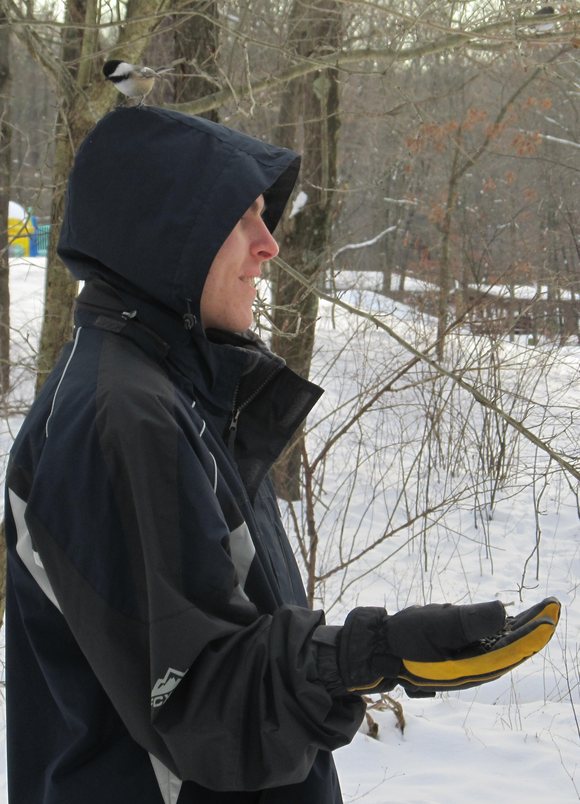
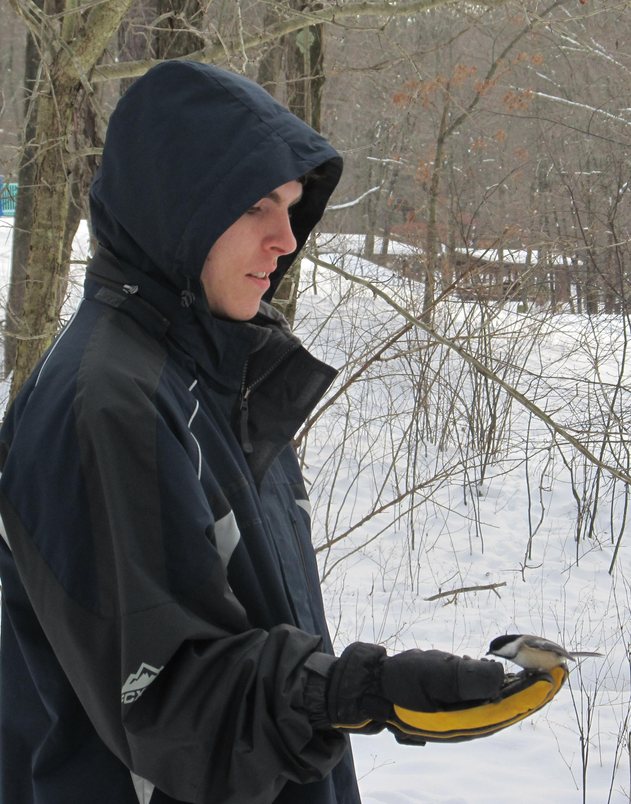
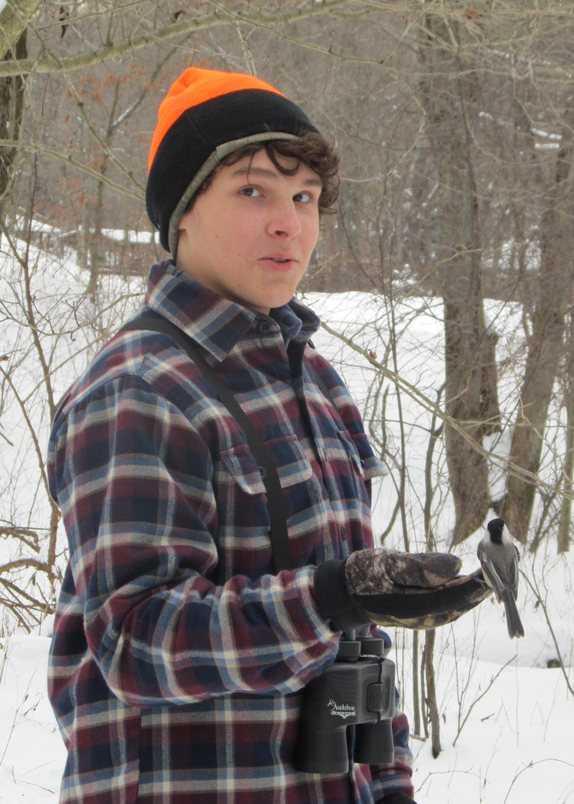
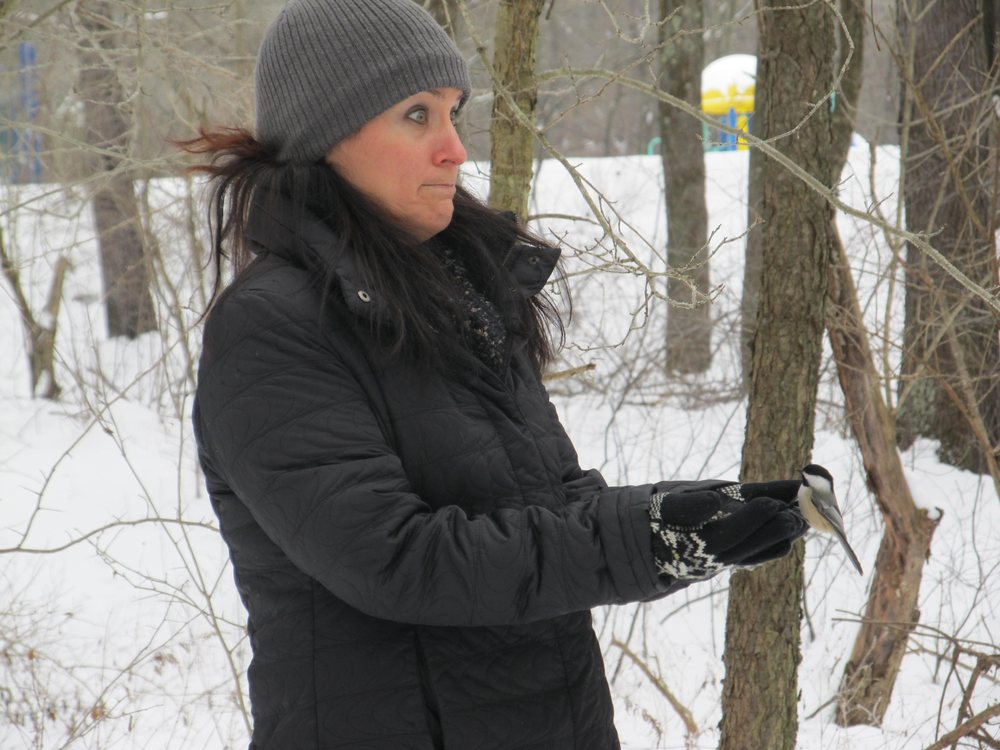
"Parus, it is always interesting to see the
different reactions from the people after we land on their hand and take a seed.
I heard one of them tell The Little Guy that
'IT
IS MAGICAL! I felt like a Disney princess!'"



"Para, even though we were the first, it's not just we chickadees getting
seeds from The Little Guy and his friends. The White-breasted Nuthatches are
taking seeds from his hand,
too."
"Parus, look at your friend 'Streak' the
nuthatch over there! I know he likes to get seeds from The Little Guy's hand, too."
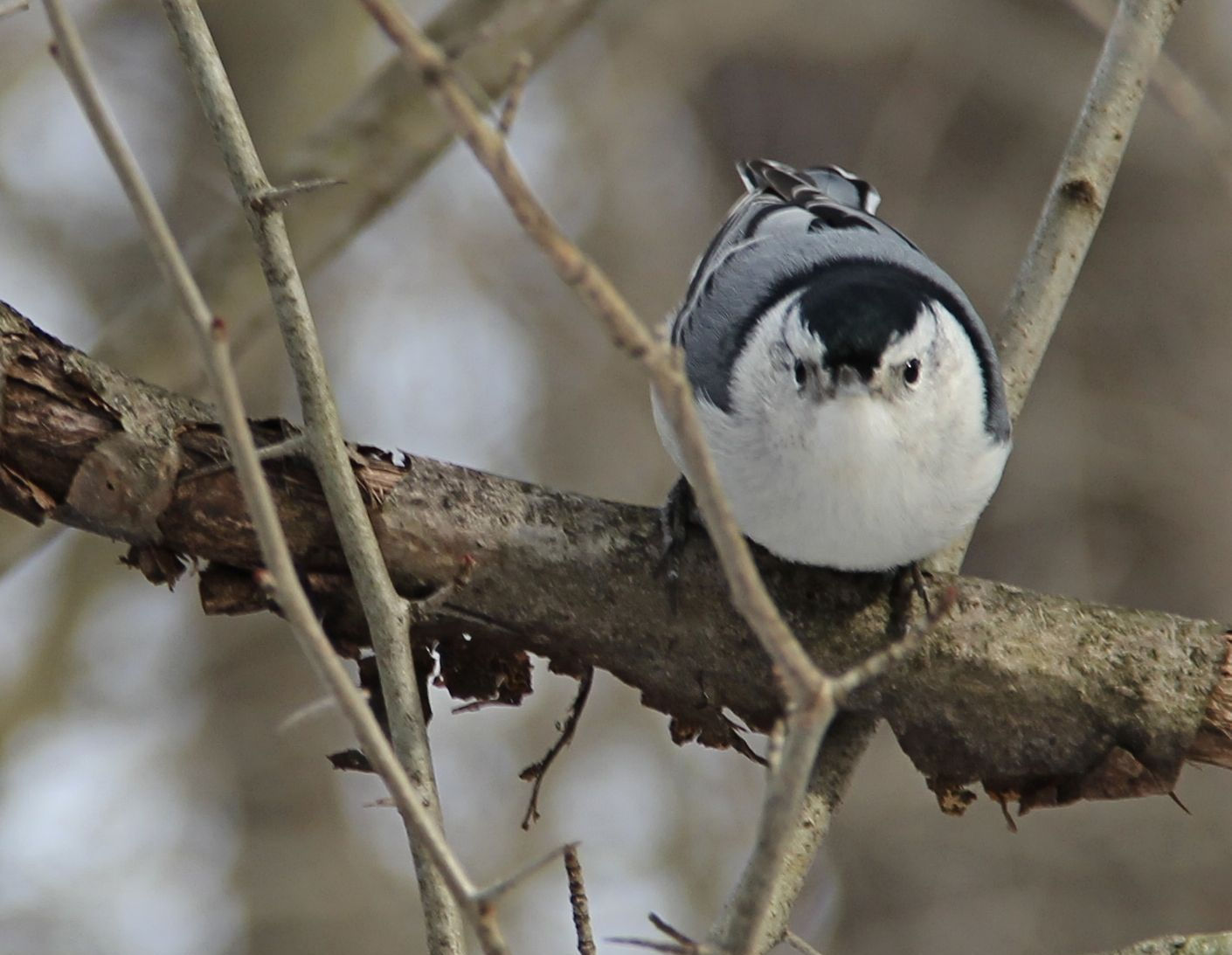
"I know that 'Streak's' friend 'Caroline' especially likes it when the person puts their hand up next to the tree
trunk for her to get the seeds that way. The Little Guy has named Caroline
'Window,' because of the small gray 'window' contrasting with the black collar
on the back of her neck."
"I also see that when we land and get seeds
from their hands, it makes them smile and be happy."
"I see that 'Tuf' the Tufted Titmouse in our
winter flock is often getting
seeds from The Little Guy and his friends. The Tufted Titmice are becoming regulars just like
us."
"Parus, I do see that some of the titmice are
checking everything out with a swoop and touch test first."
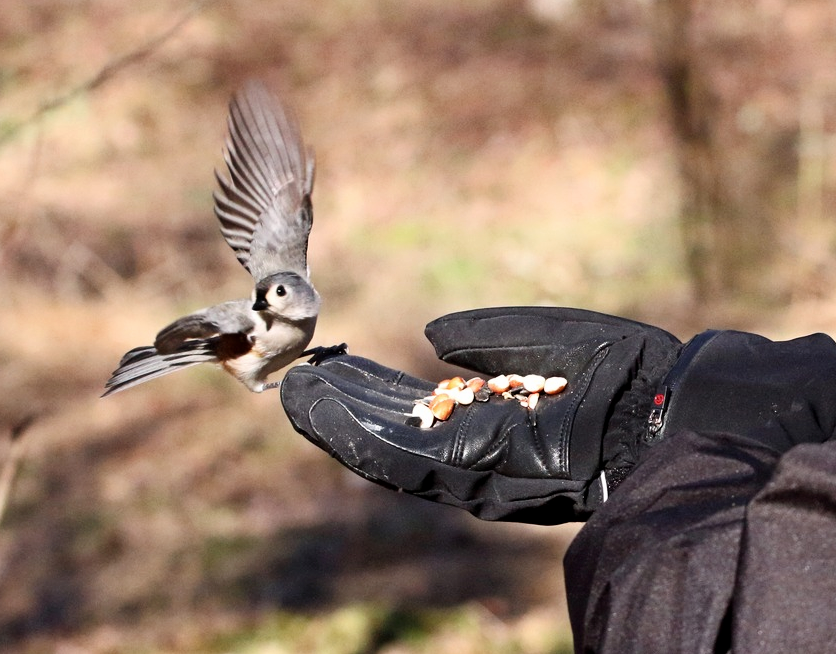
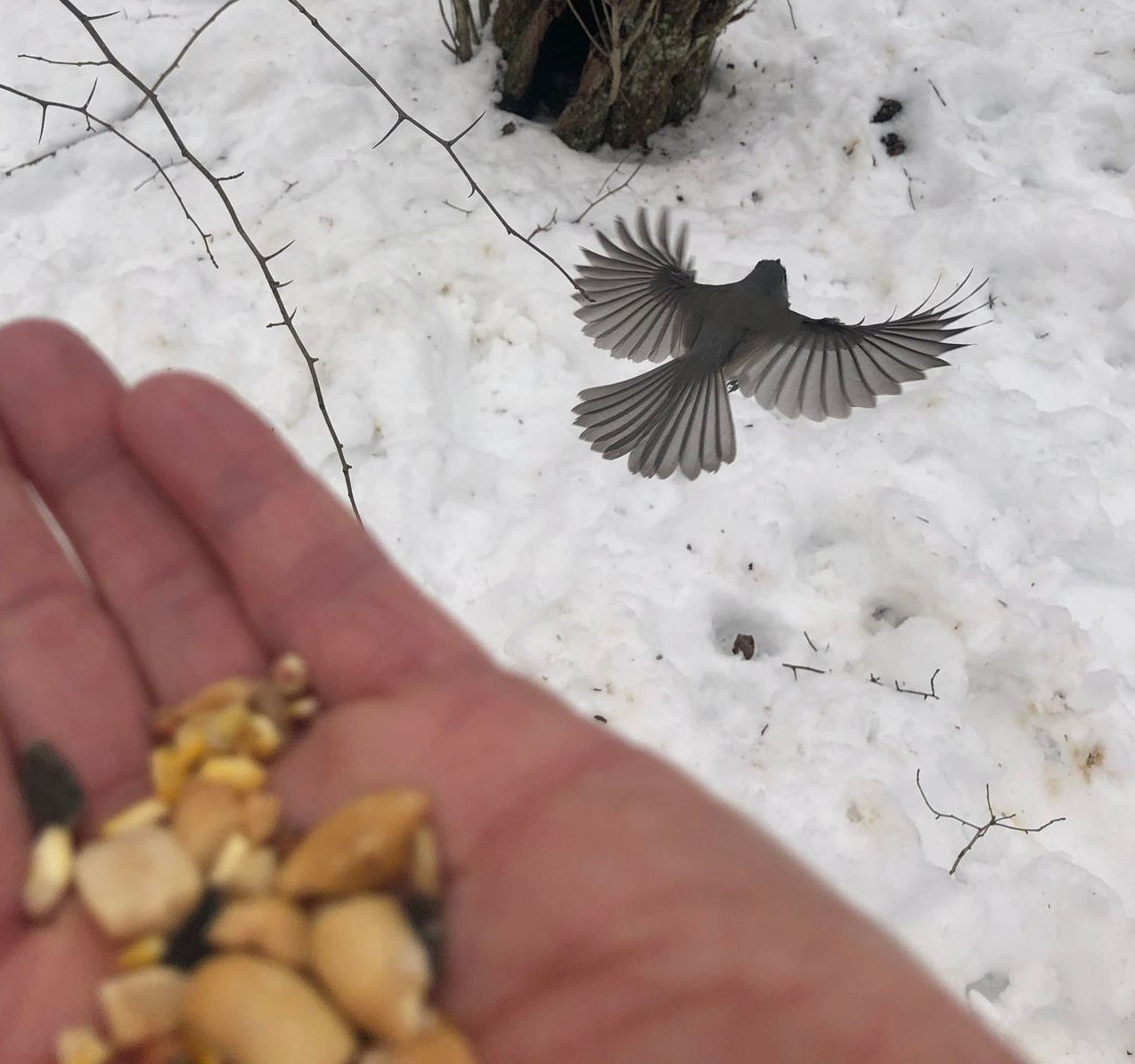
"Parus, I don't really think of Tuf as our friend,
since he is somewhat pushy and aggressive to us around The Little Guy's hand - but Tuf is a member of
our same winter flock."
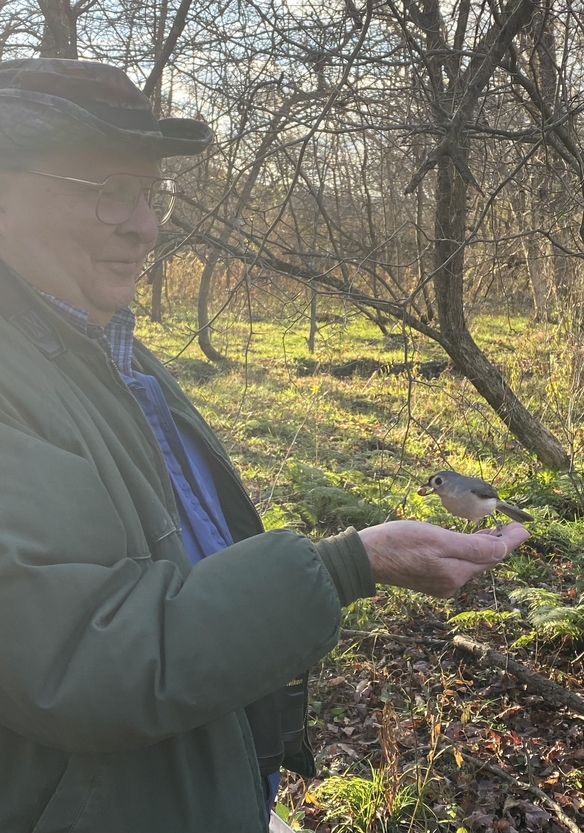



"Parus, I have noticed that a female Downy
Woodpecker has also become a regular for The Little Guy - and she will also go
to some of his friends."
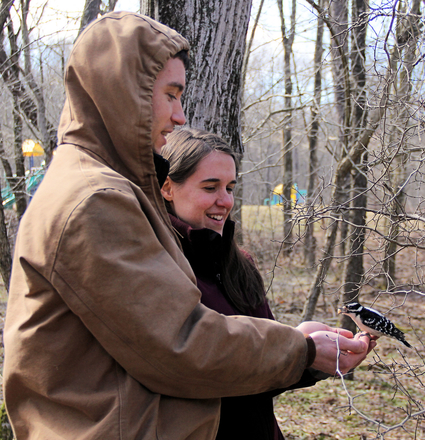
"Parus, I have seen a number of times when the
Downy Woodpecker takes a peanut from The Little Guy's hand and then puts it into
a favorite hole in the trunk of a tree nearby - and then bangs it even more
tightly into the hole. I have seen her stay on the side of the tree and eat
small pieces of it until it is gone - and then she goes and gets another peanut
or sunflower seed."
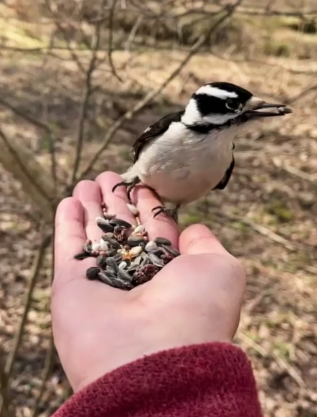
"Yes, Para, I have seen that, too, and I have also
seen the much larger Red-bellied Woodpecker immediately fly in fast and take it
from the hole - on at least two different occasions!"
"Parus, I have seen the nuthatches do the same
thing! One nuthatch will put a seed under the bark in a nearby tree, but another
nuthatch will then go take it for himself!"


"Hey, Parus, I do wonder why The Little Guy comes
out here to see us and brings us seeds almost every day."
"Para, I heard him talking to his friend Frank the
other day, and this is what I heard him say."
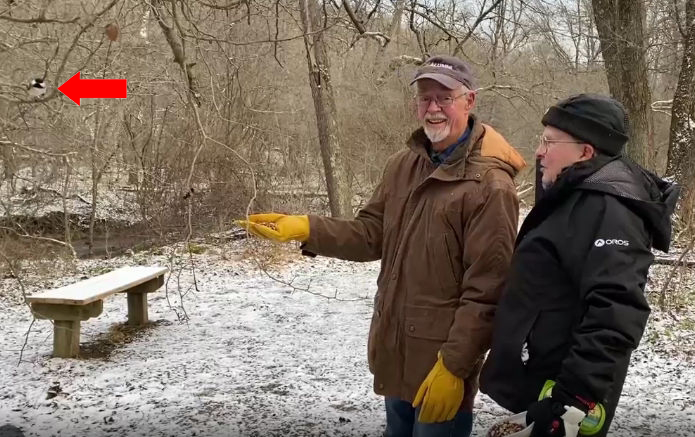
"First of all, it's just plain fun and makes me
feel good. I really like being out here feeding the wild birds from my hand."
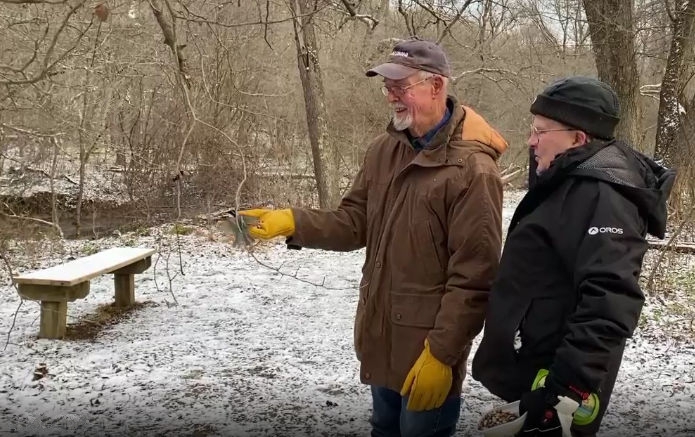
"Para, I also heard him say, 'I have seen the joy this activity brings to
people, and since I believe this
activity brings us closer to Nature in a delightful way, I believe we are
more likely to do what is necessary to protect Nature.'"
"Para, what I heard him say sounds good to
me. I think we can count on him and his friends to keep coming back to see us.
After hearing that, I don't think we have anything to fear from him at all."



"Hey, Para, do you want to hear a good one?"
"OK, Parus, tell me a good one."
"ONE!"
"Oh, Parus, your're silly."

"For such a little person, Parus, The Little Guy hangs out with some tall people
he now
brings out here with him to give us seeds."
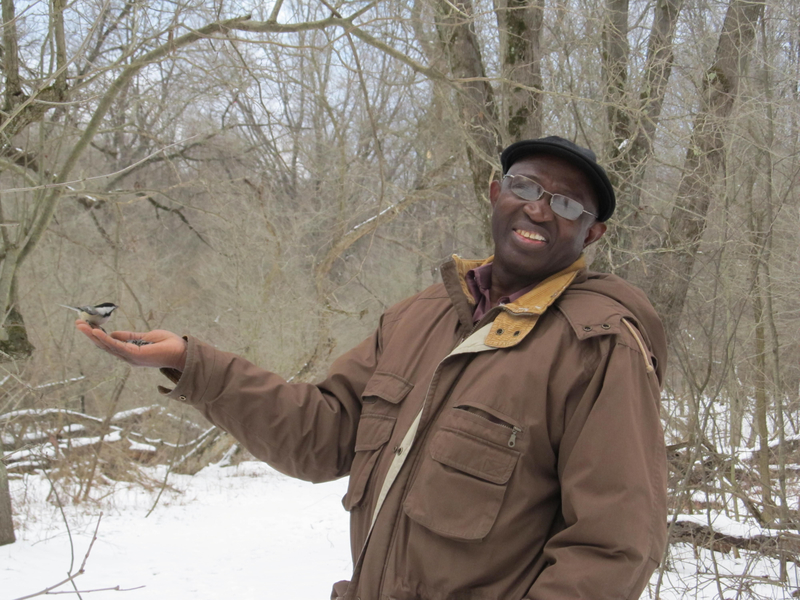
"I heard The Little Guy call his tall friend 'Amadu,'
and I heard them talking about all the good times they have had together for a
long time."
"Yep, Para,
just as we can tell our own friends apart, those people are all different in some way,
too. The Little Guy has brought many people out here now, and I am beginning to
see better how different they are from each other. Some of the people appear to
be younger and some appear to be older. I see people of all sizes and ages
coming out here now with The Little Guy to give us seeds. Sometimes, The Little
Guy is not even with them when they come out with some of their other friends to
see us. I usually still give the new people the swoop and touch test before I
land on their hand though. They are of different sizes, but I can tell them
apart especially by the differences in their faces. I see The Little Guy looking
at us very intently to try to figure out how he can tell us apart from each
other, too."
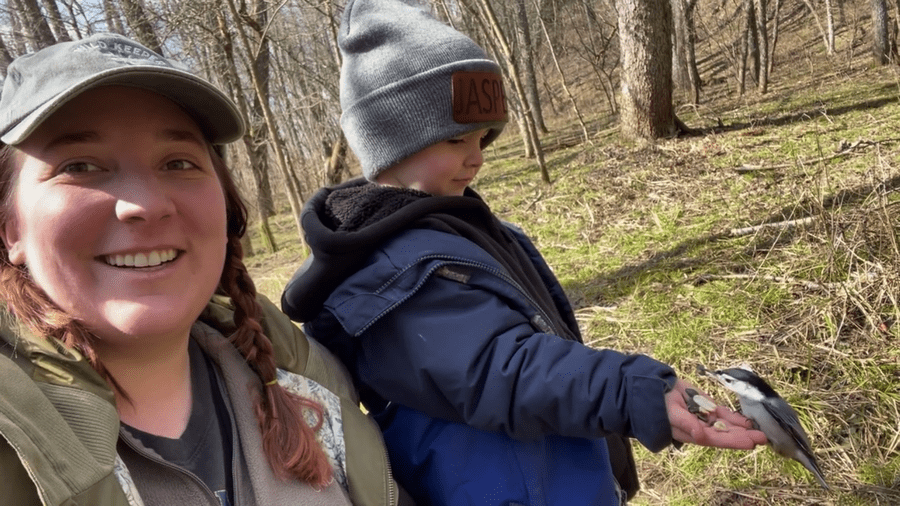
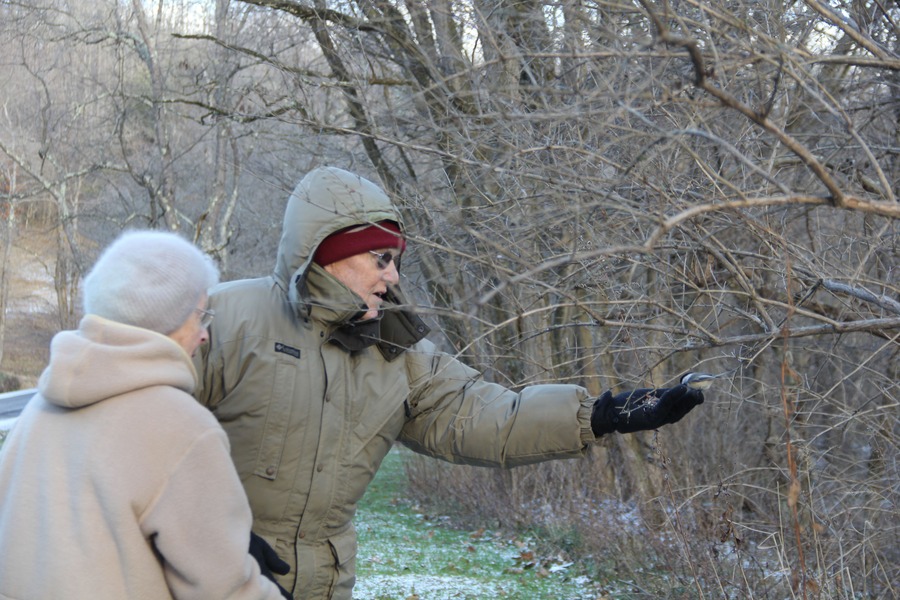
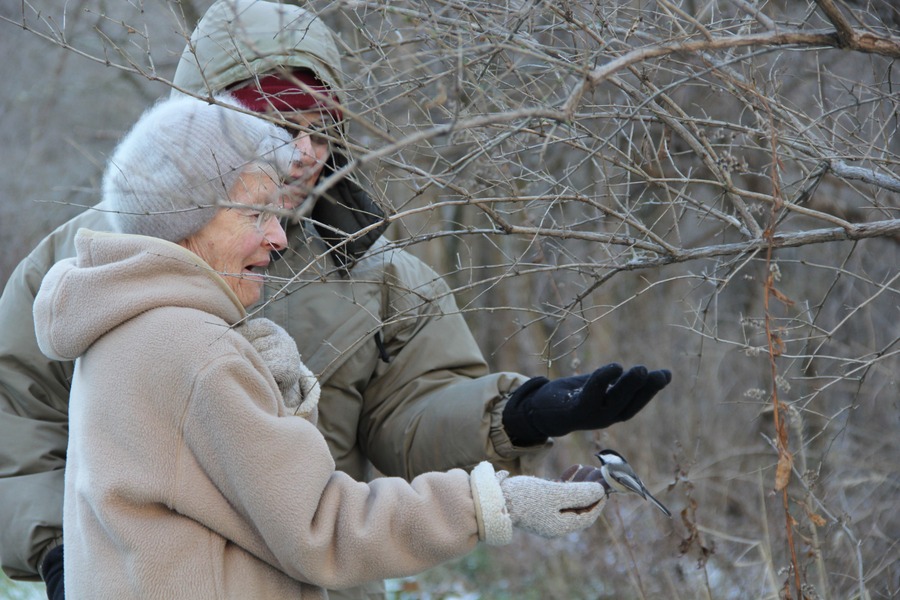
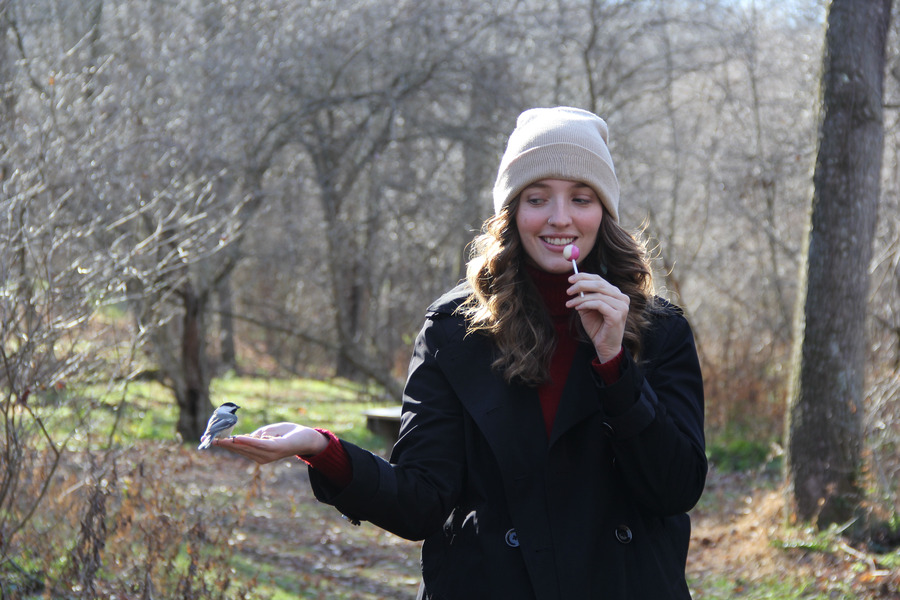
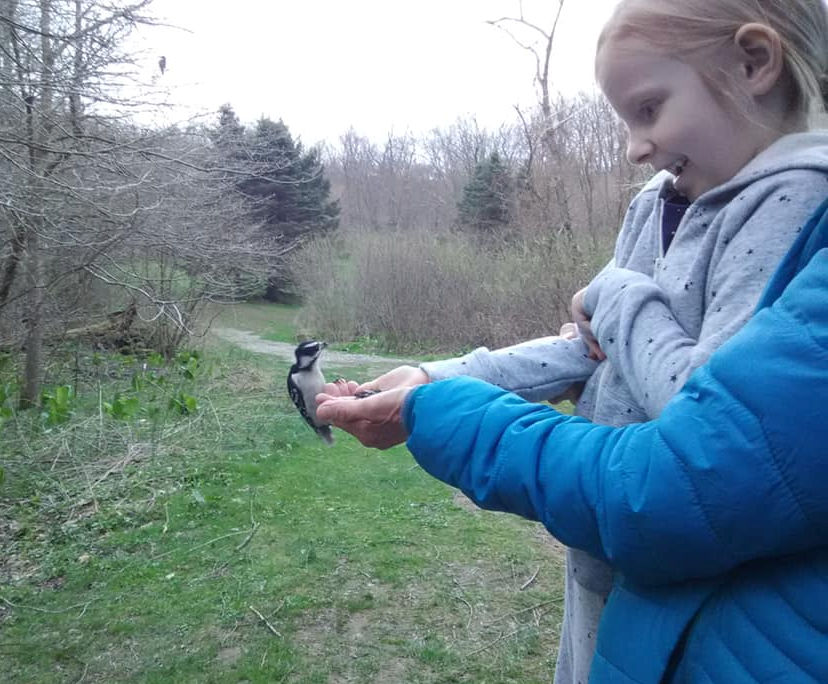



Meeting
Groups of People
"Hey, Para, do you hear that sound! It's The
Little Guy again shaking his seed container! Look, this time he has brought a
whole group of his friends! This is going to be a fun time for all of us - for
them and for us! Let's go to their hands and stock up on seeds for our cache for
later.
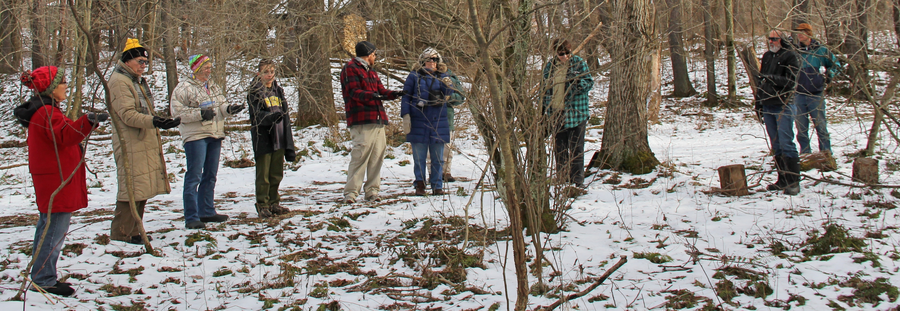
"Para, it does look to me like everyone is
having a good time together. I think it is interesting to look at the different
reactions in the faces of the different people in this group when we land on
their hands. Of course, we can't really know what they are thinking about this
experience - just like they can't really know what we are thinking."
"Parus, it looks like some of them are
really enjoying
themselves being on the outing with their friends."
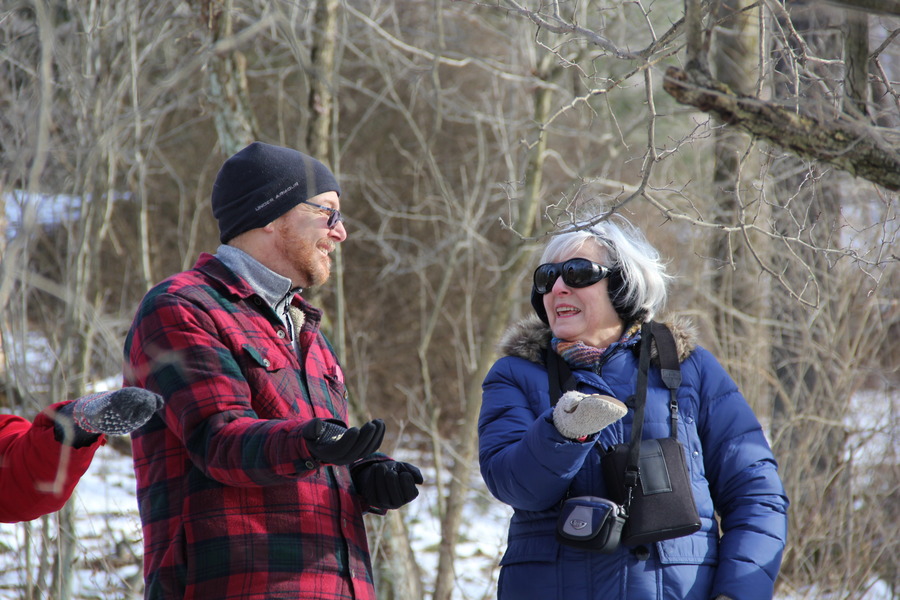
"Others seem to be thinking
deep thoughts about this experience we are sharing together."
"Parus, what do you think those people are
thinking when we are on their hands?"
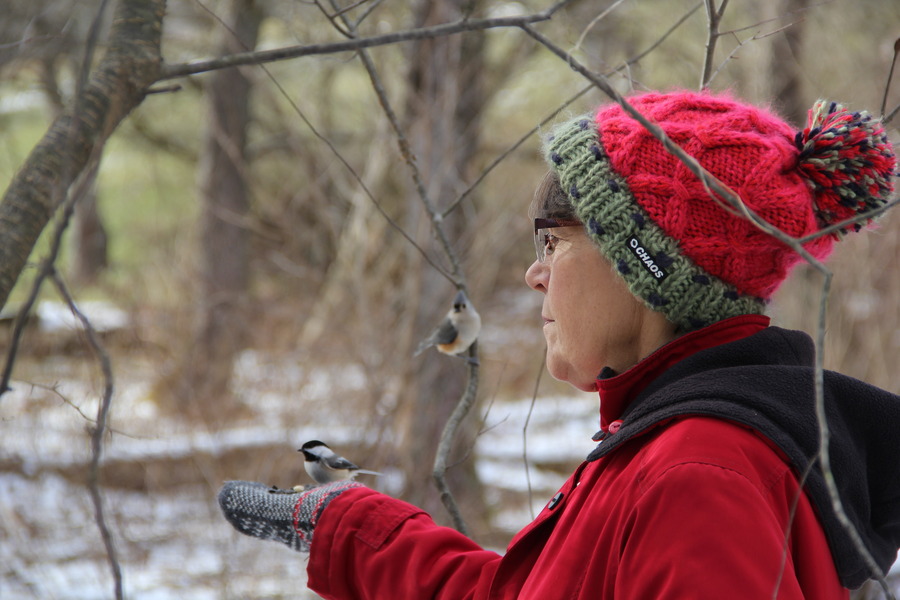
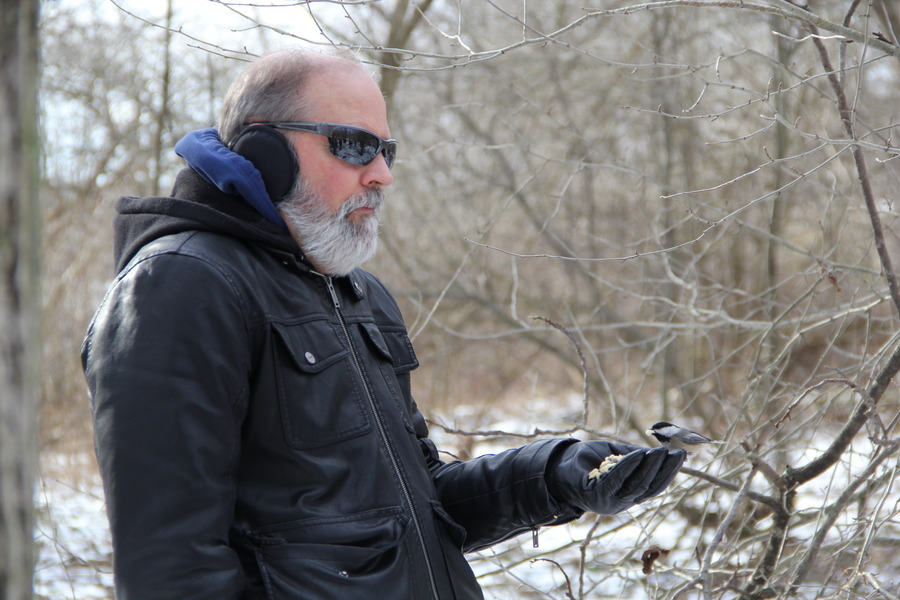
"I think all of them
are glad to be here, and I am glad they are here."
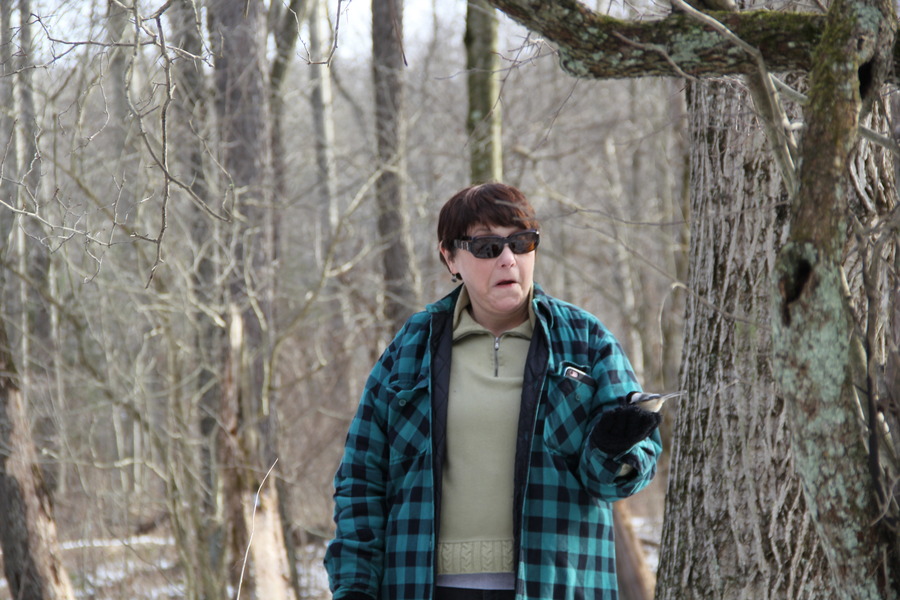



"Parus, you're not going to believe what I see
coming down the trail! The Little Guy is leading a group of FORTY people who
just arrived on that bus over there, and he has given each one of them some
seeds to give to us! I remember when he brought large groups here for the Chili
Walk and also the Hot Chocolate Walk, but this group of forty people is even
larger than those groups!"
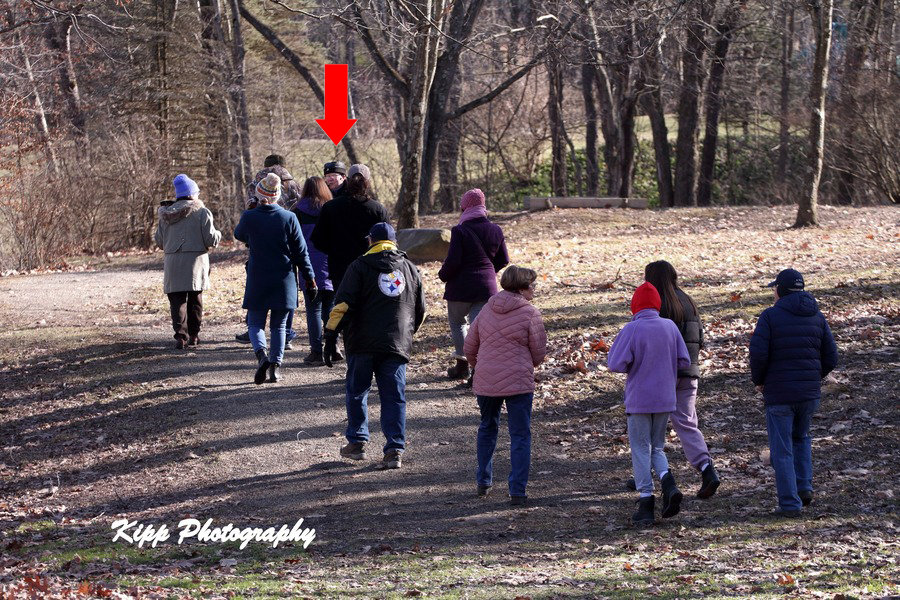
"This time, he is wearing something over his ear
and near his mouth - and his voice sounds much louder. I heard him say that he
is trying to get more people to 'Be Aware of Your Environment,' so that our
environment - our home - is protected from harm."
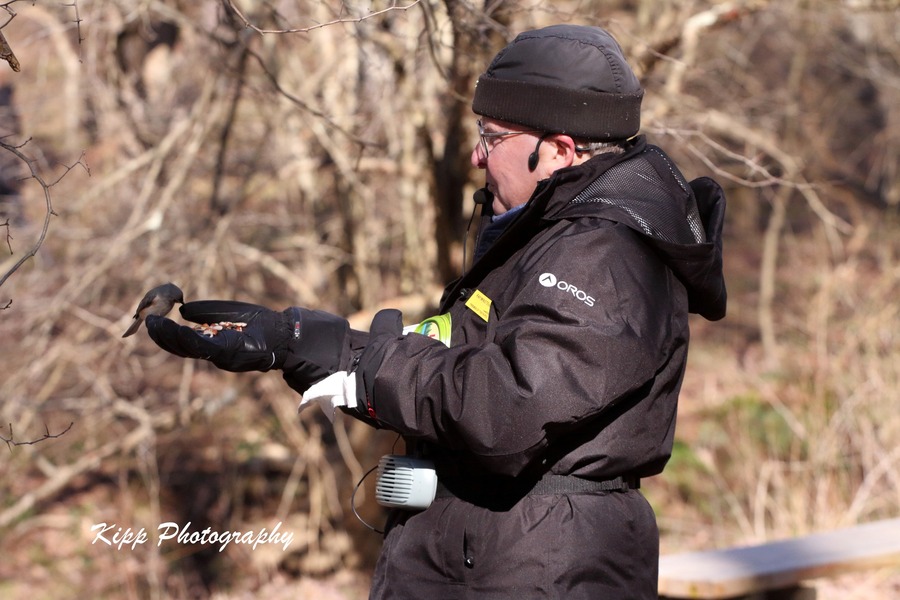
"To me, Para, it looks like everyone is having
fun, too, as our friends fly down to their hands!"
"Parus,
sometimes The Little Guy does bring a lot of people out here at one time! This
is a little scary, but he spreads them out along the trail. Our friends then
give them the swoop and touch test, and everyone gets birds to come to their
hands. I heard some people talking, and they came here from a place called the
National Aviary in a place called Pittsburgh. Seeing all those people coming
down the trail was certainly scary at first, but it worked out well for us and our
friends - and the people really seemed to be happy, too!"



Telling
Us Apart From Each Other
"Para, you know how we can tell the different people apart,
especially by looking at their faces carefully? Well, I know The Little Guy can
tell many of us apart and calls each
one of us by different
names - because of the differences he sees in us. He seems to be watching us very
carefully to learn how to tell us apart and who we are. Most people don't seem
to notice the differences between us unless they look very carefully."
"Parus, I know you are right. For example, I heard him
call me "Dot" because of the white dot I have over my left eye - the
dot
you told
me that I have there."
"Yep, I hear him tell his friends that after he
knows who we are as individuals, then he tries hard to learn more about how our behavior
is different from each other - what we do as
individuals - and how we interact with each other. I heard him explaining this
to one of his friends the other day."
"Para, I heard him say that him knowing you,
in particular, as
an individual was an exception to his general rule of how to identify our
friends right here in Blue Spruce Park. He was telling one of his friends that
the best way to tell the chickadees apart is usually the variation - the
differences - in the
margins, that is, the edges, of our black bibs over our throats."
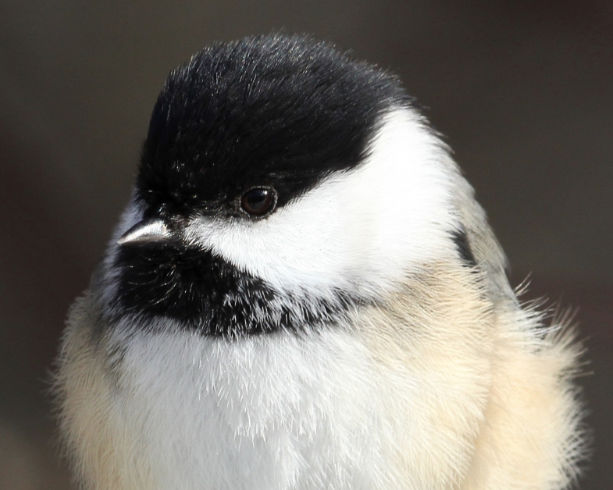
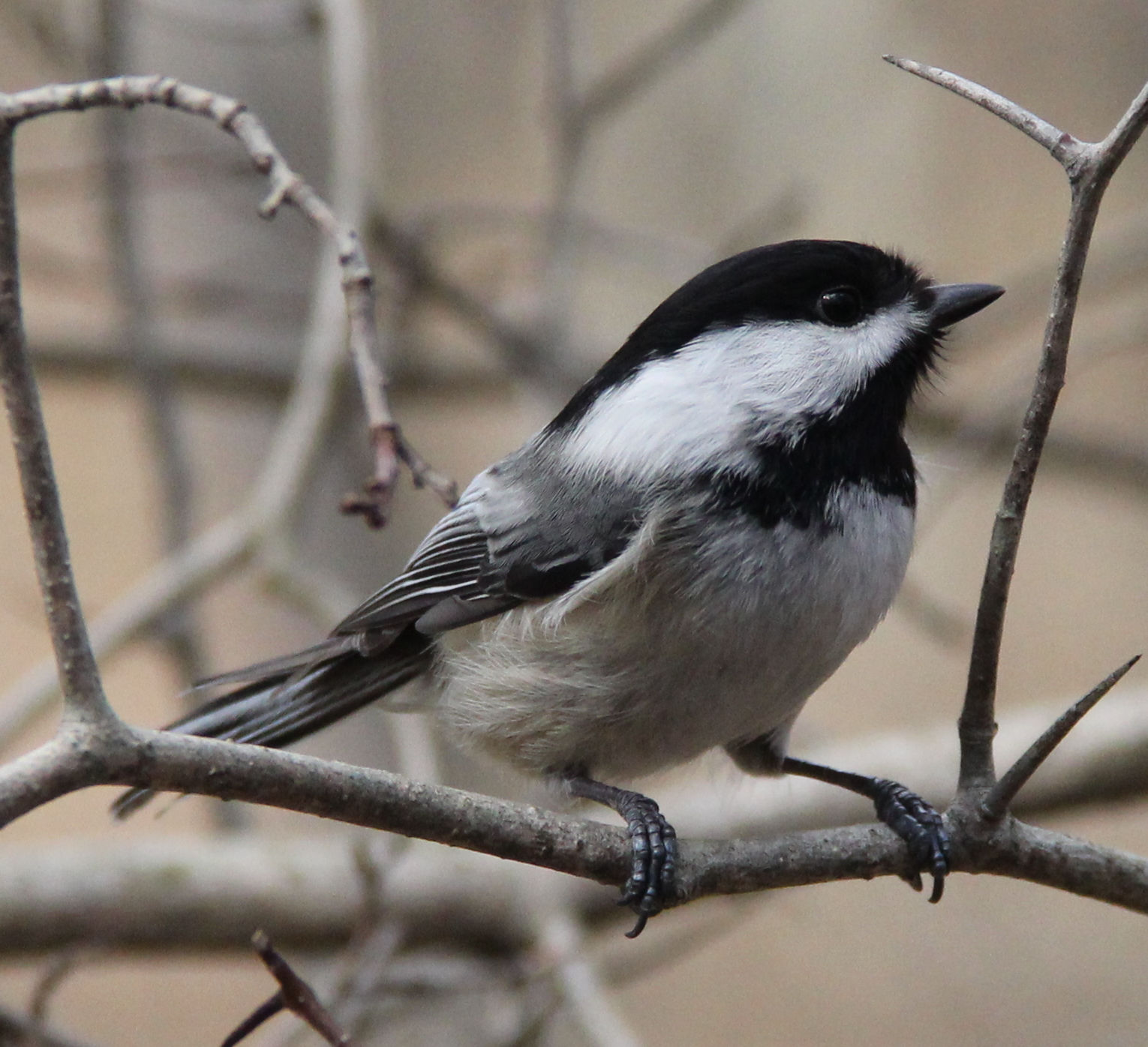
"I also heard him say that once he identifies
us as individuals, he tries to notice other things about us. For example,
besides noticing how we interact differently with each other, he also notices
how our individual voices are a little bit different from each other. You know,
for example, he has noticed that 'King George's' voice is much lower pitched
than ours - and that he is also the dominant chickadee in our winter flock. The
Little Guy has noticed that King George stays on his hand the longest and is the
most picky about his food. King George will pick up a seed, possibly reject it
by throwing it out of The Little Guy's hand, and then pick
up another one - much more than the other chickadees in our flock. King George
will show his dominance by even flying back to The Little Guy's hand with a seed already in his
beak as
he chases off another bird that just came to his hand."
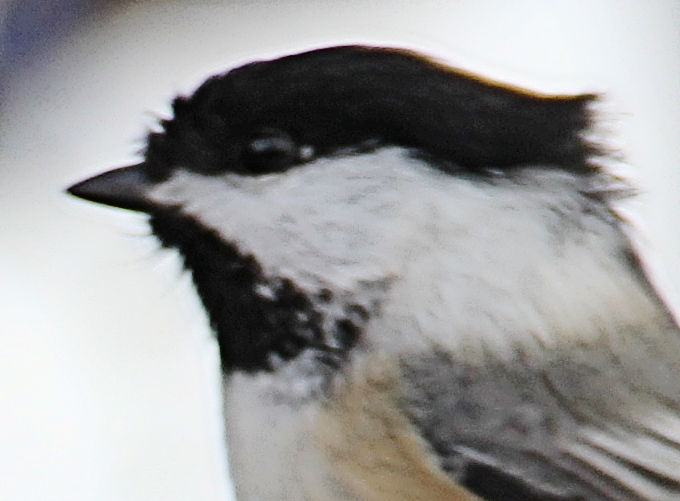
[To the reader: For more information on individual
differences, see this page.]



Types
of Seeds
"Hey, Para, what kind of bird doesn't need a
comb?"
"Parus, I don't know. What kind of bird does not
need a comb?"
"Para, the answer is a Bald Eagle!"
"Oh, Parus, you're silly."

"Parus, I heard The Little Guy's friends Margaret
and Roger suggest to him to see if we would like to get peanut halves from his
hand, as well as the Black Oil Sunflower Seeds he has been giving to us."
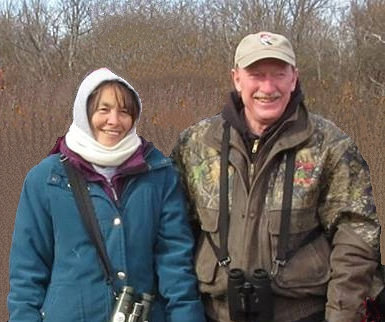
"I sure am glad he offers us both the sunflower
seeds and peanuts now!"
"I have now seen that more than half of our
chickadee friends would rather take a peanut half, rather than take a sunflower
seed."
"Parus, I also would rather eat a peanut! I like
to take little 'beak bites' from the peanut half as I sit holding the peanut
with my feet on a branch. I know The Little Guy has noticed that after we take
the first seed - or peanut, we land on a nearby branch and then eat some of it
right then in front of him. Then we go back to his hand over and over again to
take seeds and peanuts to our cache to eat later."
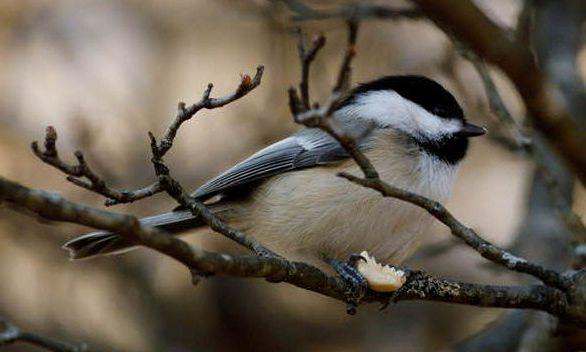
"Parus, I have also noticed that almost all the
titmice, almost all the nuthatches, and the Downy Woodpecker would not only
rather eat the peanuts, but almost always take a peanut. Sometimes, however,
they do take a sunflower seed."
"Para, I am glad he only brings the peanuts and
sunflower seeds to give to us. Some people just bring little seeds or cracked
corn, but we usually just don't bother with those types of seeds."
"I also remember when The Little Guy tried to see
if we would like to eat both live or dead 'mealworms' - mixed in with the
sunflower seeds and peanuts. I know that some of us did pick them up, but then
we just threw them out of his hand! Maybe some other birds in other places like
them, but we don't."
[To the reader: For more information on types of
seeds and their energy content, see this page.]



"Hey, Para, what do you get if you're kissed
by a bird?"
"Parus, I know the answer to this one!"
"When you're kissed by a bird, you get a peck on
the cheek!"
"Para, you're certainly right about that!"

"Para, I have noticed that while The Little Guy
is feeding us out of his hand, a number of other birds come over to this area
and watch what is going on. Several Cardinals often get pretty close to him -
but do not go to his hand. Sometimes, they do land on the ground or branches
right next to him. When The Little Guy walks away from his favorite spot where
he likes to feed us out of his hand, other birds fly to the ground where he was
standing to get the seeds that have been knocked out of his hands by birds
flying in and out of his hand. I have seen 8 - 10 Blue Jays fly down on a
regular basis to look for the seeds that may be there. Along with them will
often be a pair of Red-bellied Woodpeckers, as well as pairs of Cardinals.
All of them seem to be very cautious - that is,
being very careful and safe - and maybe even afraid - to go to his hand. I do see them landing on
close branches nearby looking carefully at us going to his hand. Maybe one day,
they will go to his hand, too. Actually, they often act like bullies and seem to be too aggressive around
us smaller birds, so I hope they just come later as they do now. As The Little
Guy leaves the woods, many of us smaller birds follow him to get the last seeds of the day
from his hand - while the larger birds are checking out the ground where we were."



Accessible Sidewalk Pathway
"Parus, I bet you remember when you and I both
followed The Little Guy away from the woods into the playground area toward the
woman in a wheelchair. I remember how he led us a few steps at a time up the
hill out of the woods. I remember how we flew to his hand, took our seeds to our
cache, and when we went back to him after a few minutes, he had moved even closer to the woman.
After a little while, we were near her, and then we took seeds from her hand, too! Since she was in a
wheelchair, she could not go into the woods where we usually are, so The Little
Guy led us up to her."
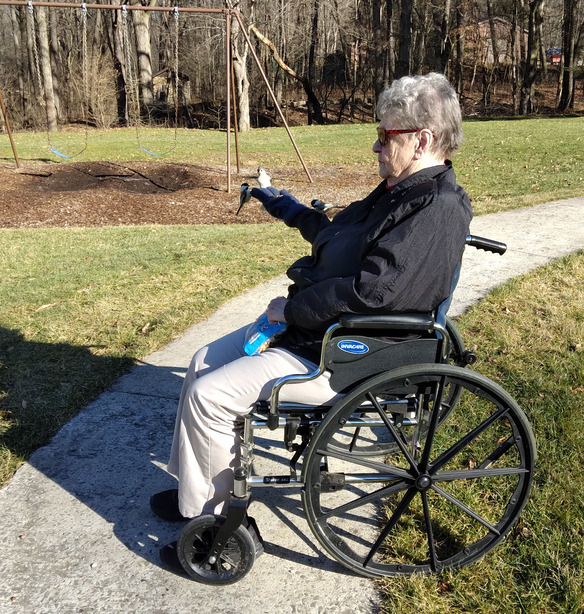
"After that experience, Para, I heard how The Little Guy contacted Ed, his friend and
the person in charge of the park, and suggested that an extension of the sidewalk
be built for people in wheelchairs, so that they could feed the birds out of
their hands, too."
"Parus, I remember going to Ed's hand in the
past!"
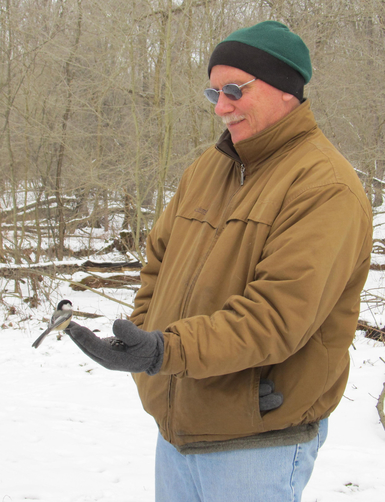
"Parus, I heard The Little Guy tell someone that his friend Ed would make sure that a sidewalk
would be put in for people in wheelchairs to come into the woods to feed us from
their hands."
[Updated Below.]



A
Sudden Commotion of Running and Yelling!
"Parus, Come over here and listen to this! The Little Guy is telling the story to his
friend about what happened right here the other day while he was here with us. I
remember seeing this happen!"
"OK, Para, I'll listen to his story, too."

"A sudden commotion of running
and yelling immediately captured my attention earlier this afternoon right here
at Blue Spruce Park. While feeding the chickadees out of my hand for an hour at
my usual spot on Getty Run Trail, I heard this ruckus down the trail a short
distance to my right away from the playground. Two Long-tailed Weasels (!) were
on the ground at first - but then they went racing up a large tree trunk, one
appearing to be chasing and one appearing trying to escape!
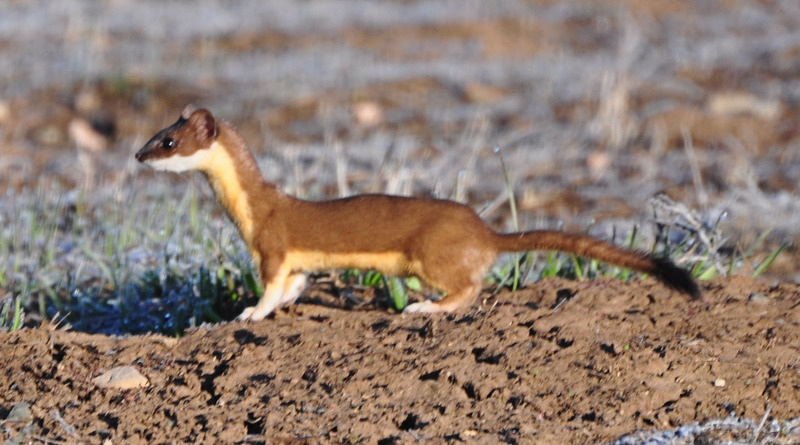
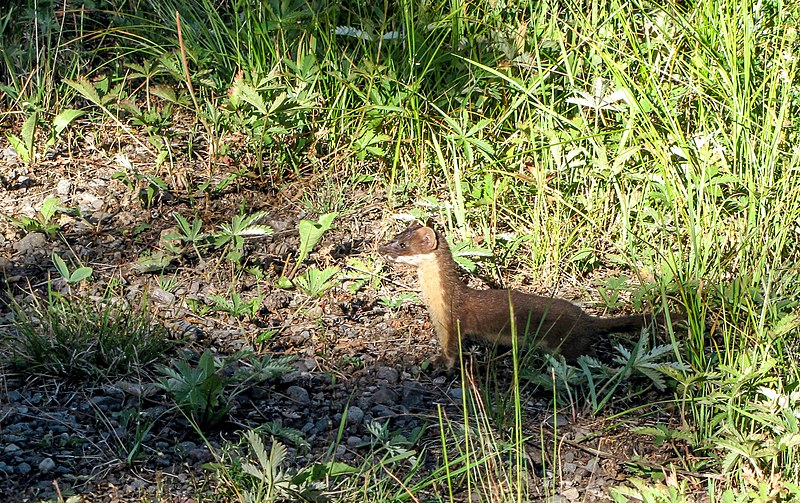
I heard scampering feet moving
fast over the bark, and at least one of them was “yelling.” Having seen a
Short-tailed Weasel out at Blue Spruce a number of years ago, I immediately
keyed in on the tails. (Both Long-tailed Weasels and Short-tailed Weasels are
found in western Pennsylvania.) The bodies of both brown individuals were long
and skinny, and their tails were also narrow and almost as long as the rest of
their bodies, very different than a Short-tailed Weasel. They were about 17
inches long, including their long tails.
(Gray Squirrels, Red
Squirrels, and Chipmunks are often seen in the same area, and these two
individuals were noticeably different. More recently I have had a Red Squirrel
coming up close to me both on the ground and on the branches right in front of
me a number of times as I feed the chickadees. I figure this is too close for my
own safety, since he easily could make a short jump onto me to get to the seeds,
so I have been discouraging that by making sudden movements. Today a chipmunk,
as often is the case, was also coming close to me.)
The two weasels ran up the
tree trunk at least 50 feet. The lead weasel ran out to the end of a high branch
with the chaser close behind. The leader hesitated only briefly and then
launched himself/herself into the air! He was really up there high, as I said,
at least 50 feet up, jumped, opened up, and “sort-of glided,” or tried to glide
like a flying squirrel. He jumped toward my general direction, spreading out his
short legs, but did not demonstrate any wide gliding surface as you would see on
a flying squirrel. With his long tail streaming behind, I guess his stance did
slow him down some, and his jump (and gliding) propelled him quite a ways out
away from the tree. He landed nearby but out of my direct sight over the edge
of a little embankment in the little stream area. Besides the little stream in
that area, there was also a “sandbar” nearby on the other side of the stream
where the jumper could have landed. Although I was probably close enough, I did
not hear a splash or landing, so he probably landed on soft ground, such as the
sandbar. The chaser rapidly ran down the tree trunk and over to the area where
the jumper had landed, but he then kept going in the direction of the lake. A
little later I walked over to the landing area, but I saw no evidence of the
jumper/leader. (The next day I examined the other side of the stream more
carefully, and I DID find more than 20 fresh-looking footprints of the right
size in the mud on the sandbar. The footprints could have been from the jumper,
the chaser, or both of them. A triangular measurement of the height of the
branch above the base of the tree was exactly 53 feet, and the streambed sandbar
was another two feet down, so the height from the branch to the sandbar was 55
feet.)
Long-tailed Weasels are
usually solitary, secretive, and most of the time nocturnal. Both males and
females usually defend their own, individual territories. (However, maybe the
ones I saw were just playing!) They are efficient predators, usually eating a
variety of small mammals, some larger than themselves. According to the
Pennsylvania Game Commission, the breeding season is usually in July and August
with the young being born the following April or May. (Embryos develop a little
initially, then lie dormant over the winter until development begins again about
a month before birth.) The male may take food to the mother and young.
When you are out at Blue
Spruce Park expect the unexpected! You are also encouraged to spend some time
looking for something neat whenever and wherever you are in the park, since it
is probably right there in front of you, if you look for it. Be Aware of your
environment!"



Leaving
the Winter Flock
"Hey, Para, winter is basically over now, and
it is about time for us to leave the winter flock. Some of our friends have
already left. It's spring time now, and this is the time of year that we all
leave the winter flock and spread out to make our nests in different areas. It's
time to go raise some more young chickadees - just like we did last year. I
think going up there near the top of that hill over there will be a good place
for us to have a nest again this year. I remember last year when you picked out
the perfect place for us to hollow out a hole in a tree trunk to put the nest. I
remember how you made a cup-shaped nest using moss at first and then putting
rabbit fur on top where you would lay the eggs."
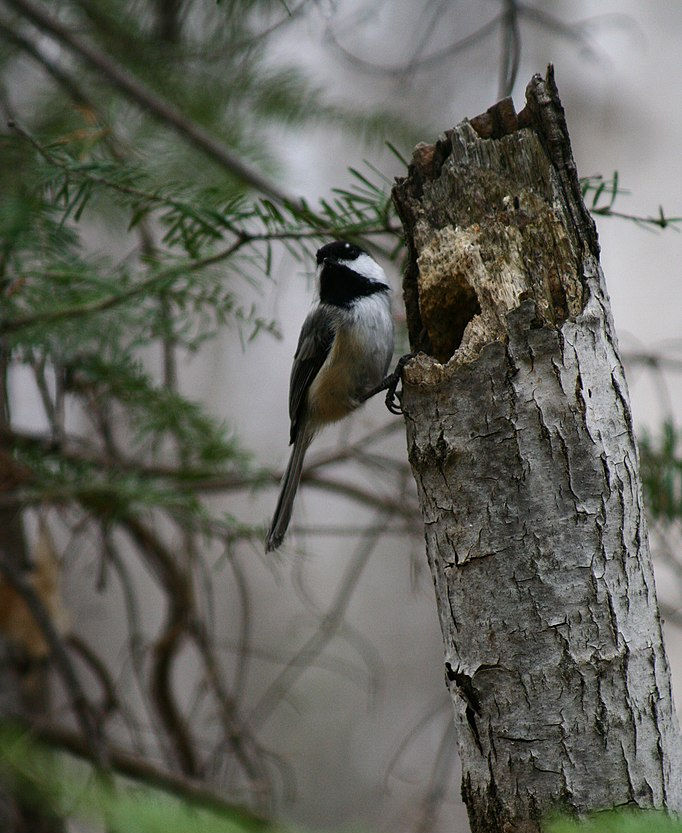
"Parus, of course, I do remember. It was all so
cozy for us! During the spring and summer, we will be able to get plenty of
insects, caterpillars, and spiders to eat up there for ourselves and for our
young'uns. We can show our young how to get seeds from the hand of The Little
Guy next fall and winter. Some of the other kinds of birds that will be nesting
around here in the spring spent their winter much farther south of here and are
migrating back into this area now to build their nests. We chickadees can
survive here in the winter just fine, so we don't need to migrate."
"So, Para, let's say goodbye to our friends
here, and head on up to our nesting territory. We will tell them that we plan to
see them again in the winter flock here on
Getty Run Trail in Blue Spruce Park"
"I do think we should visit the winter area
briefly sometime later to check on that new sidewalk!"
"I hope The Little Guy will also bring back
some more of his friends next fall and winter."






Accessible Sidewalk Pathway Update
"Parus, let's go visit the part of the park
where we spent the winter with our friends and see what's going on there now."
"OK, Para, let's do that."

"Hey, look, Para, now there really is a sidewalk going into the woods - the sidewalk
that Ed and his workers built!"
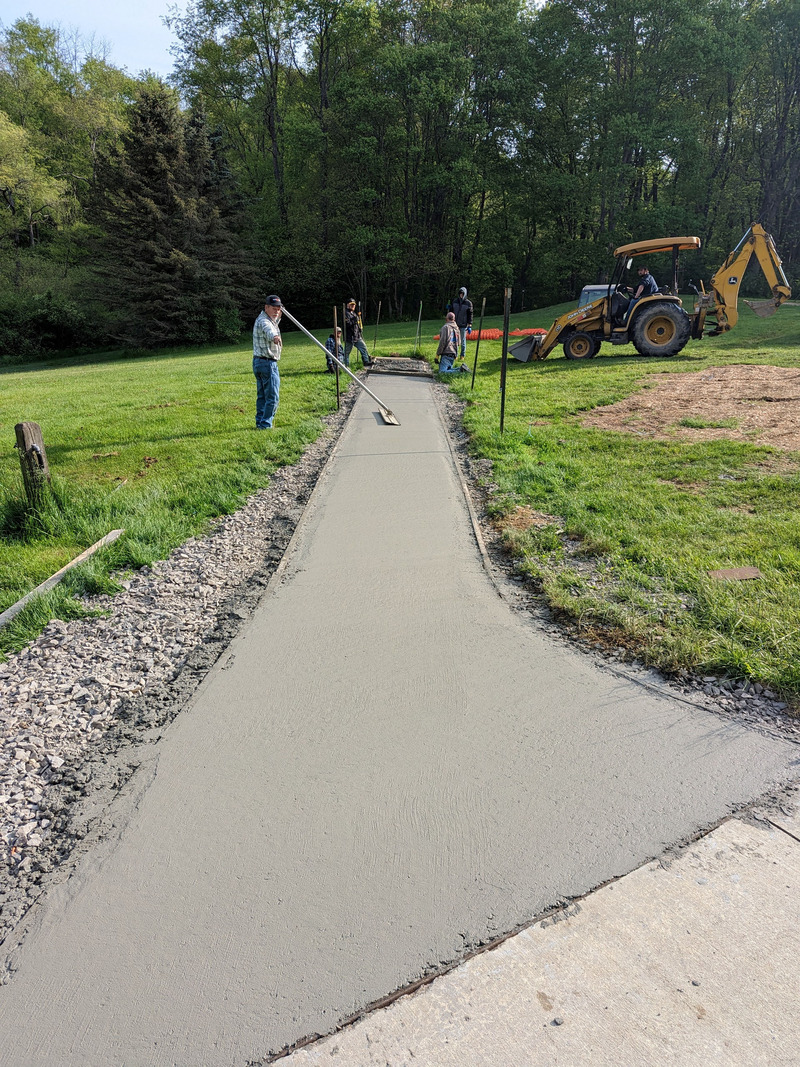
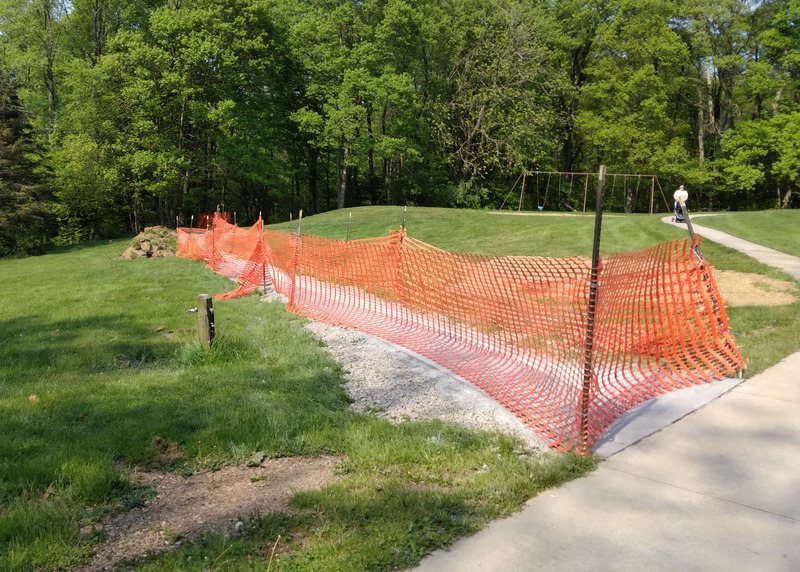
"I think this fall and winter, everyone will be
glad there is a new sidewalk going into the woods where our winter flock will
be!"
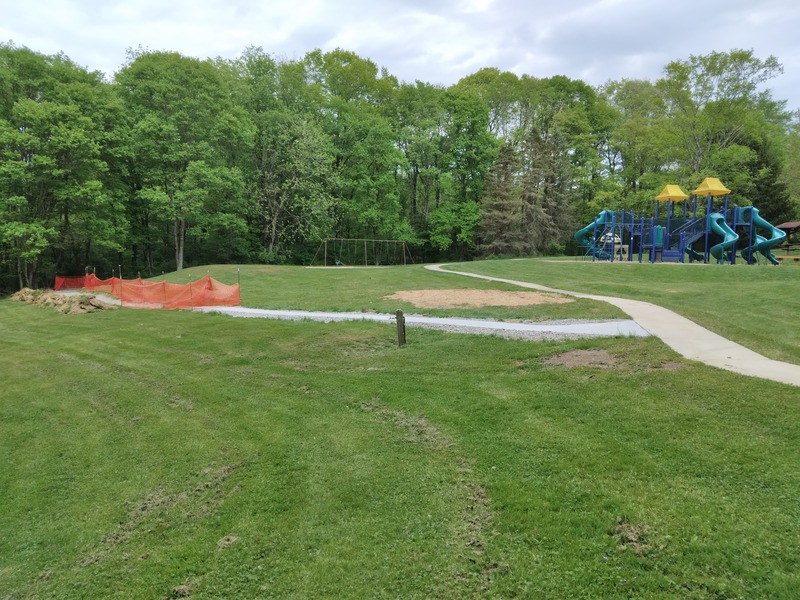
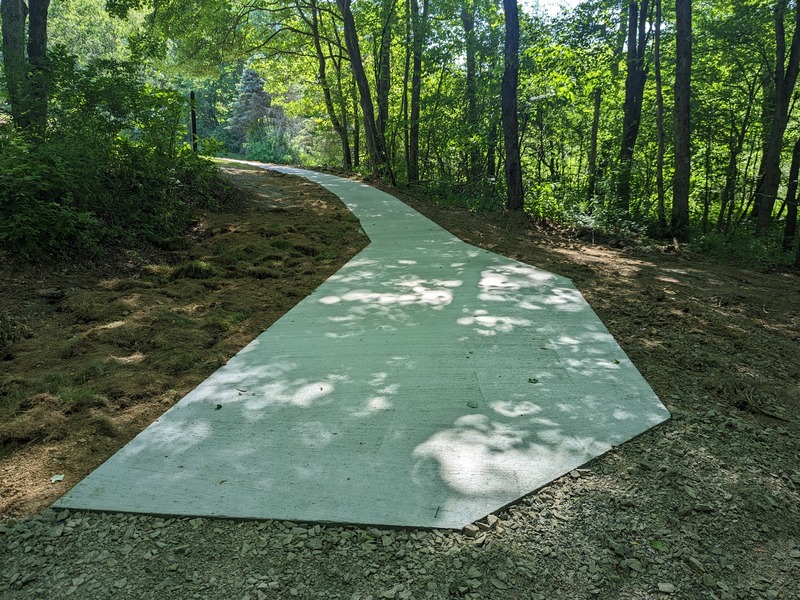
"Para, I also heard that a number of
people helped to make the sidewalk a reality. Some local groups and
individuals gave money for that project."
[To the reader: For more information about this
special sidewalk project, see Chickadee Pathway.]



"Hey, Para, this is not a joke - but for real.
Do you know what I heard The Little Guy say that people call a flock of
chickadees?
"No, Parus, what do people call a flock of
chickadees?
"Para, They call us a 'banditry,' since the
mask over our eyes makes us look like little bandits - or robbers."
"Oh, Parus, you're kidding me again, right?"
"No, Para, that's for real!"

